Client Area Designer For WHMCS
(→Tips) |
(→Panels) |
||
| Line 210: | Line 210: | ||
|} | |} | ||
{| | {| | ||
| − | |style="padding: 0px 0px 20px 25px;"|[[File: | + | |style="padding: 0px 0px 20px 25px;"|[[File:CAD_10.png]] |
|} | |} | ||
{| | {| | ||
| Line 219: | Line 219: | ||
|} | |} | ||
{| | {| | ||
| − | |style="padding: 0px 0px 20px 25px;"|[[File: | + | |style="padding: 0px 0px 20px 25px;"|[[File:CAD_11.png]] |
|} | |} | ||
====Edit Element==== | ====Edit Element==== | ||
| Line 230: | Line 230: | ||
|} | |} | ||
{| | {| | ||
| − | |style="padding: 0px 0px 30px 25px;"|[[File: | + | |style="padding: 0px 0px 30px 25px;"|[[File:CAD_12.png]] |
|} | |} | ||
{| | {| | ||
| Line 241: | Line 241: | ||
|} | |} | ||
{| | {| | ||
| − | |style="padding: 0px 0px 30px 25px;"|[[File: | + | |style="padding: 0px 0px 30px 25px;"|[[File:CAD_13.png]] |
|} | |} | ||
====New Parent Elements==== | ====New Parent Elements==== | ||
{| | {| | ||
| − | |style="padding: 10px 0px 15px 15px;"| | + | |style="padding: 10px 0px 15px 15px;"|It is possible add a completely new parent element either on left or right side.<br/>Press '' 'Add'.'' |
|} | |} | ||
{| | {| | ||
| − | |style="padding: 0px 0px 30px 25px;"|[[File: | + | |style="padding: 0px 0px 30px 25px;"|[[File:CAD_14.png]] |
|} | |} | ||
{| | {| | ||
| Line 260: | Line 260: | ||
|} | |} | ||
{| | {| | ||
| − | |style="padding: 0px 0px 30px 25px;"|[[File: | + | |style="padding: 0px 0px 30px 25px;"|[[File:CAD_15.png]] |
|} | |} | ||
{| | {| | ||
| Line 267: | Line 267: | ||
|} | |} | ||
{| | {| | ||
| − | |style="padding: 0px 0px 20px 25px;"|[[File: | + | |style="padding: 0px 0px 20px 25px;"|[[File:CAD_16.png]] |
|} | |} | ||
{| | {| | ||
| Line 273: | Line 273: | ||
|} | |} | ||
{| | {| | ||
| − | |style="padding: 0px 0px 30px 25px;"|[[File: | + | |style="padding: 0px 0px 30px 25px;"|[[File:CAD_17.png]] |
|} | |} | ||
| Line 281: | Line 281: | ||
|} | |} | ||
{| | {| | ||
| − | |style="padding: 0px 0px 30px 25px;"|[[File: | + | |style="padding: 0px 0px 30px 25px;"|[[File:CAD_18.png]] |
|} | |} | ||
{| | {| | ||
| Line 291: | Line 291: | ||
|} | |} | ||
{| | {| | ||
| − | |style="padding: 0px 0px 30px 25px;"|[[File: | + | |style="padding: 0px 0px 30px 25px;"|[[File:CAD_19.png]] |
|} | |} | ||
{| | {| | ||
| Line 298: | Line 298: | ||
|} | |} | ||
{| | {| | ||
| − | |style="padding: 0px 0px 20px 25px;"|[[File: | + | |style="padding: 0px 0px 20px 25px;"|[[File:CAD_20.png]] |
|} | |} | ||
{| | {| | ||
| Line 304: | Line 304: | ||
|} | |} | ||
{| | {| | ||
| − | |style="padding: 0px 0px 30px 25px;"|[[File: | + | |style="padding: 0px 0px 30px 25px;"|[[File:CAD_21.png]] |
|} | |} | ||
{| | {| | ||
| Line 310: | Line 310: | ||
|} | |} | ||
{| | {| | ||
| − | |style="padding: 0px 0px 30px 25px;"|[[File: | + | |style="padding: 0px 0px 30px 25px;"|[[File:CAD_22.png]] |
|} | |} | ||
| Line 317: | Line 317: | ||
|style="padding: 10px 0px 15px 15px;"|Sidebar panels section refer to the elements located on the left side of your client area.<br/> | |style="padding: 10px 0px 15px 15px;"|Sidebar panels section refer to the elements located on the left side of your client area.<br/> | ||
Generally, management of sidebars is very similar to Navbar panels described in the previous section.<br/> | Generally, management of sidebars is very similar to Navbar panels described in the previous section.<br/> | ||
| − | + | On the first sight, you will find there sidebar elements divided into top and Bottom part. | |
|} | |} | ||
{| | {| | ||
| − | |style="padding: 0px 0px 20px 25px;"|[[File: | + | |style="padding: 0px 0px 20px 25px;"|[[File:CAD_23.png]] |
|} | |} | ||
{| | {| | ||
| Line 330: | Line 330: | ||
|} | |} | ||
{| | {| | ||
| − | |style="padding: 0px 0px 20px 25px;"|[[File: | + | |style="padding: 0px 0px 20px 25px;"|[[File:CAD_24.png]] |
|} | |} | ||
| Line 342: | Line 342: | ||
|} | |} | ||
{| | {| | ||
| − | |style="padding: 0px 0px 30px 25px;"|[[File: | + | |style="padding: 0px 0px 30px 25px;"|[[File:CAD_25.png]] |
|} | |} | ||
{| | {| | ||
| Line 350: | Line 350: | ||
|} | |} | ||
{| | {| | ||
| − | |style="padding: 0px 0px 30px 25px;"|[[File: | + | |style="padding: 0px 0px 30px 25px;"|[[File:CAD_26.png]] |
|} | |} | ||
{| | {| | ||
| Line 358: | Line 358: | ||
|} | |} | ||
{| | {| | ||
| − | |style="padding: 0px 0px 30px 25px;"|[[File: | + | |style="padding: 0px 0px 30px 25px;"|[[File:CAD_27.png]] |
|} | |} | ||
| Line 366: | Line 366: | ||
|} | |} | ||
{| | {| | ||
| − | |style="padding: 0px 0px 30px 25px;"|[[File: | + | |style="padding: 0px 0px 30px 25px;"|[[File:CAD_28.png]] |
|} | |} | ||
{| | {| | ||
| Line 377: | Line 377: | ||
|} | |} | ||
{| | {| | ||
| − | |style="padding: 0px 0px 30px 25px;"|[[File: | + | |style="padding: 0px 0px 30px 25px;"|[[File:CAD_29.png]] |
|} | |} | ||
{| | {| | ||
| Line 384: | Line 384: | ||
|} | |} | ||
{| | {| | ||
| − | |style="padding: 0px 0px 20px 25px;"|[[File: | + | |style="padding: 0px 0px 20px 25px;"|[[File:CAD_30.png]] |
|} | |} | ||
{| | {| | ||
| Line 391: | Line 391: | ||
|} | |} | ||
{| | {| | ||
| − | |style="padding: 0px 0px 20px 25px;"|[[File: | + | |style="padding: 0px 0px 20px 25px;"|[[File:CAD_31.png]] |
|} | |} | ||
{| | {| | ||
| Line 397: | Line 397: | ||
|} | |} | ||
{| | {| | ||
| − | |style="padding: 0px 0px 30px 25px;"|[[File: | + | |style="padding: 0px 0px 30px 25px;"|[[File:CAD_32.png]] |
|} | |} | ||
| Line 405: | Line 405: | ||
|} | |} | ||
{| | {| | ||
| − | |style="padding: 0px 0px 30px 25px;"|[[File: | + | |style="padding: 0px 0px 30px 25px;"|[[File:CAD_33.png]] |
|} | |} | ||
{| | {| | ||
| Line 416: | Line 416: | ||
|} | |} | ||
{| | {| | ||
| − | |style="padding: 0px 0px 30px 25px;"|[[File: | + | |style="padding: 0px 0px 30px 25px;"|[[File:CAD_34.png]] |
|} | |} | ||
{| | {| | ||
| Line 423: | Line 423: | ||
|} | |} | ||
{| | {| | ||
| − | |style="padding: 0px 0px 20px 25px;"|[[File: | + | |style="padding: 0px 0px 20px 25px;"|[[File:CAD_35.png]] |
|} | |} | ||
{| | {| | ||
| Line 429: | Line 429: | ||
|} | |} | ||
{| | {| | ||
| − | |style="padding: 0px 0px 30px 25px;"|[[File: | + | |style="padding: 0px 0px 30px 25px;"|[[File:CAD_36.png]] |
|} | |} | ||
{| | {| | ||
| Line 435: | Line 435: | ||
|} | |} | ||
{| | {| | ||
| − | |style="padding: 0px 0px 30px 25px;"|[[File: | + | |style="padding: 0px 0px 30px 25px;"|[[File:CAD_37.png]] |
|} | |} | ||
| Line 443: | Line 443: | ||
|} | |} | ||
{| | {| | ||
| − | |style="padding: 0px 0px 20px 25px;"|[[File: | + | |style="padding: 0px 0px 20px 25px;"|[[File:CAD_38.png]] |
|} | |} | ||
{| | {| | ||
| Line 449: | Line 449: | ||
|} | |} | ||
{| | {| | ||
| − | |style="padding: 0px 0px 20px 25px;"|[[File: | + | |style="padding: 0px 0px 20px 25px;"|[[File:CAD_39.png]] |
|} | |} | ||
{| | {| | ||
| Line 459: | Line 459: | ||
|} | |} | ||
{| | {| | ||
| − | |style="padding: 0px 0px 20px 25px;"|[[File: | + | |style="padding: 0px 0px 20px 25px;"|[[File:CAD_40.png]] |
|} | |} | ||
| Line 471: | Line 471: | ||
|} | |} | ||
{| | {| | ||
| − | |style="padding: 0px 0px 30px 25px;"|[[File: | + | |style="padding: 0px 0px 30px 25px;"|[[File:CAD_41.png]] |
|} | |} | ||
{| | {| | ||
| Line 479: | Line 479: | ||
|} | |} | ||
{| | {| | ||
| − | |style="padding: 0px 0px 30px 25px;"|[[File: | + | |style="padding: 0px 0px 30px 25px;"|[[File:CAD_42.png]] |
|} | |} | ||
{| | {| | ||
| Line 487: | Line 487: | ||
|} | |} | ||
{| | {| | ||
| − | |style="padding: 0px 0px 30px 25px;"|[[File: | + | |style="padding: 0px 0px 30px 25px;"|[[File:CAD_43.png]] |
|} | |} | ||
| Line 495: | Line 495: | ||
|} | |} | ||
{| | {| | ||
| − | |style="padding: 0px 0px 30px 25px;"|[[File: | + | |style="padding: 0px 0px 30px 25px;"|[[File:CAD_44.png]] |
|} | |} | ||
{| | {| | ||
| Line 506: | Line 506: | ||
|} | |} | ||
{| | {| | ||
| − | |style="padding: 0px 0px 30px 25px;"|[[File: | + | |style="padding: 0px 0px 30px 25px;"|[[File:CAD_45.png]] |
|} | |} | ||
{| | {| | ||
| Line 512: | Line 512: | ||
|} | |} | ||
{| | {| | ||
| − | |style="padding: 0px 0px 20px 25px;"|[[File: | + | |style="padding: 0px 0px 20px 25px;"|[[File:CAD_46.png]] |
|} | |} | ||
{| | {| | ||
| Line 519: | Line 519: | ||
|} | |} | ||
{| | {| | ||
| − | |style="padding: 0px 0px 20px 25px;"|[[File: | + | |style="padding: 0px 0px 20px 25px;"|[[File:CAD_47.png]] |
|} | |} | ||
{| | {| | ||
| Line 525: | Line 525: | ||
|} | |} | ||
{| | {| | ||
| − | |style="padding: 0px 0px 30px 25px;"|[[File: | + | |style="padding: 0px 0px 30px 25px;"|[[File:CAD_48.png]] |
|} | |} | ||
| Line 533: | Line 533: | ||
|} | |} | ||
{| | {| | ||
| − | |style="padding: 0px 0px 30px 25px;"|[[File: | + | |style="padding: 0px 0px 30px 25px;"|[[File:CAD_49.png]] |
|} | |} | ||
{| | {| | ||
| Line 544: | Line 544: | ||
|} | |} | ||
{| | {| | ||
| − | |style="padding: 0px 0px 30px 25px;"|[[File: | + | |style="padding: 0px 0px 30px 25px;"|[[File:CAD_50.png]] |
|} | |} | ||
{| | {| | ||
| Line 551: | Line 551: | ||
|} | |} | ||
{| | {| | ||
| − | |style="padding: 0px 0px 20px 25px;"|[[File: | + | |style="padding: 0px 0px 20px 25px;"|[[File:CAD_51.png]] |
|} | |} | ||
{| | {| | ||
| Line 557: | Line 557: | ||
|} | |} | ||
{| | {| | ||
| − | |style="padding: 0px 0px 30px 25px;"|[[File: | + | |style="padding: 0px 0px 30px 25px;"|[[File:CAD_52.png]] |
|} | |} | ||
{| | {| | ||
| Line 563: | Line 563: | ||
|} | |} | ||
{| | {| | ||
| − | |style="padding: 0px 0px 30px 25px;"|[[File: | + | |style="padding: 0px 0px 30px 25px;"|[[File:CAD_53.png]] |
|} | |} | ||
Revision as of 07:31, 21 September 2016
Contents |
About Client Area Designer For WHMCS
| Client Area Designer For WHMCS is a module that allows administrators to manage their client area final view. Change the order of displayed elements, add new ones or hide them if you do not want your clients to access them. |
- Module Features:
| ✔ Customize Your Client Area By Modifying: |
| ✔ Navbar Elements |
| ✔ Sidebar Elements |
| ✔ Homepage Widgets |
| ✔ Add Your Own Elements & Widgets |
| ✔ Scan Your Client Area In Search Of Custom Elements & Widgets |
| ✔ View & Modify List Of Known Locations In Your Client Area |
- Navbar Element Features:
| ✔ Define Name |
| ✔ Define URI |
| ✔ Define Icon |
| ✔ Define Display Rules: |
| ✔ Client Owns Domain |
| ✔ Client Owns Product |
| ✔ Client Is In Location |
| ✔ Add Multiple Links To Element |
- Sidebar Element Features:
| ✔ Define Name |
| ✔ Define URI Of 2nd Level Elements Only |
| ✔ Define Icon |
| ✔ Define Display Rules: |
| ✔ Client Owns Domain |
| ✔ Client Owns Product |
| ✔ Client Is In Location |
| ✔ Choose One Feature Per Element: |
| ✔ Add Multiple Links To Element |
| ✔ Define Custom Body & Footer Content - Support HTML, CSS & JavaScript |
- Homepage Widget Features:
| ✔ Define Name |
| ✔ Define URI Of 2nd Level Elements Only |
| ✔ Define Icon |
| ✔ Define Style Color |
| ✔ Define Widget Button |
| ✔ Choose One Feature Per Widget: |
| ✔ Add Multiple Links To Element |
| ✔ Define Custom Body & Footer Content - Support HTML, CSS & JavaScript |
- General Info:
| ✔ Multi-Language Support |
| ✔ Supports WHMCS V6 |
Installation
| This tutorial will show you how to successfully install and configure Client Area Designer For WHMCS. We will guide you step by step through the whole installation and configuration process. |
| 1. Log in to your client area and download Client Area Designer For WHMCS. |
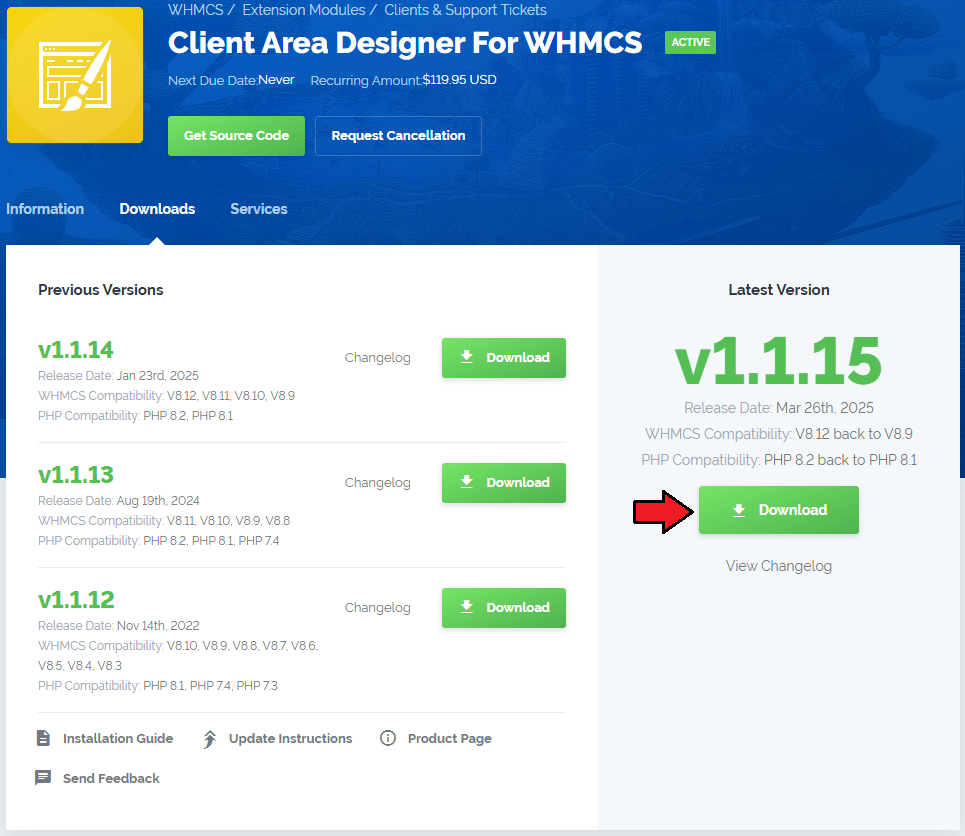
|
| 2. Upload and extract the module into the main WHMCS directory. Files in your WHMCS directory should look like on the following screen. |

|
| 3. When you install Client Area Designer for the first time you have to rename 'license_RENAME.php' file. File is located in 'modules/addons/ClientAreaDesignerModule/license_RENAME.php'. Rename it from 'license_RENAME.php' to 'license.php'. |
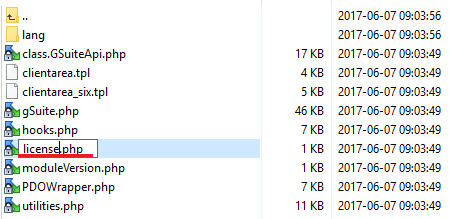
|
| 4. In order to configure your license key, you have to edit the previously renamed 'license.php' file. Enter your license key between quotation marks as presented on the following screen. You can find your license key in your client area → 'My Products'. |

|
| 5. Now you have to activate the module in your WHMCS system. Log in to your WHMCS admin area. Go to 'Setup' → 'Addon Modules'. Afterwards, find 'Client Area Designer' and press 'Activate' button. |
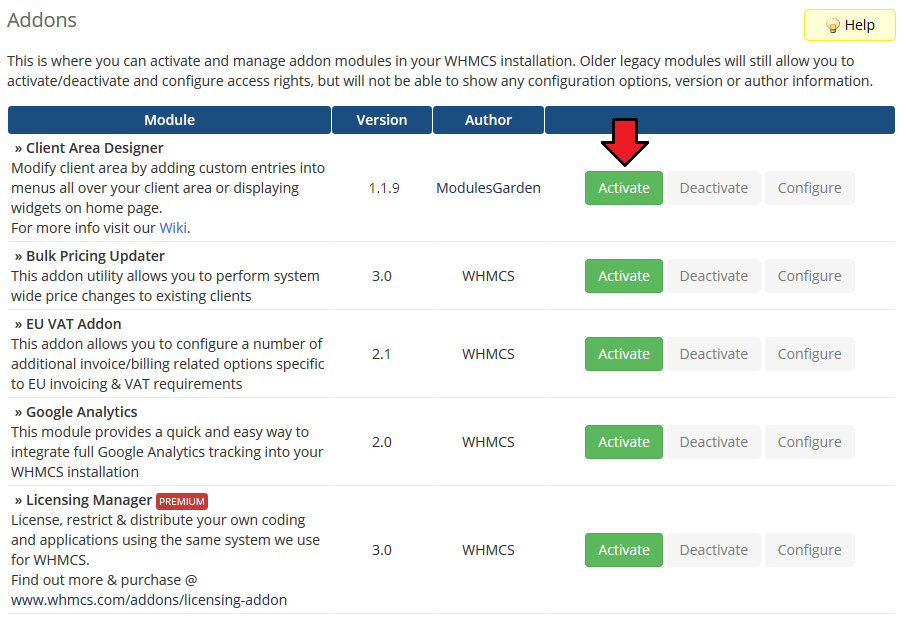
|
| 6. In the next step you need to permit access to this module. To do so, click on 'Configure' button, tick 'Full Administrator' and press 'Save Changes'. |
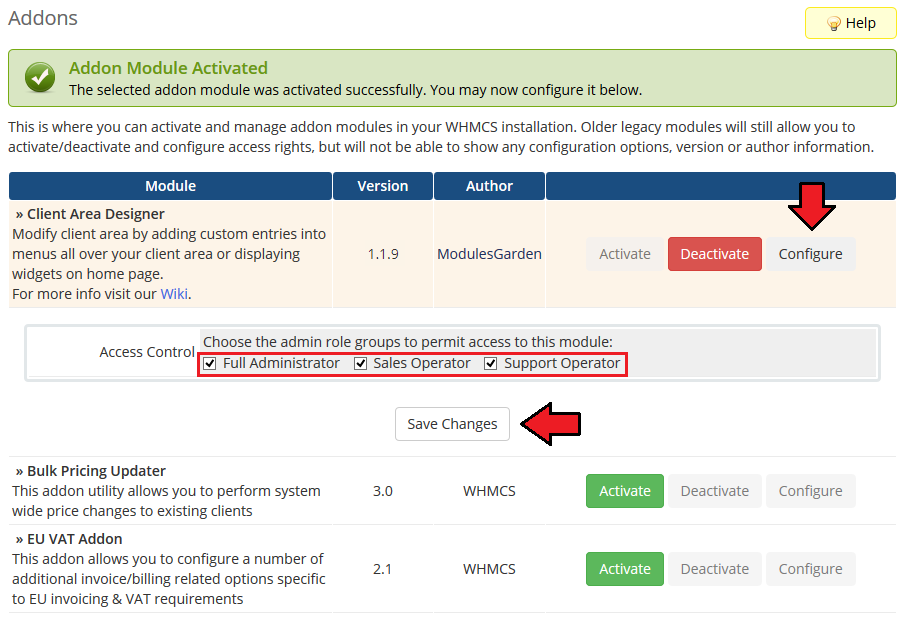
|
| 7. You have just successfully installed Client Area Designer For WHMCS! You can access your module under 'Addons' → 'Client Area Designer'. |
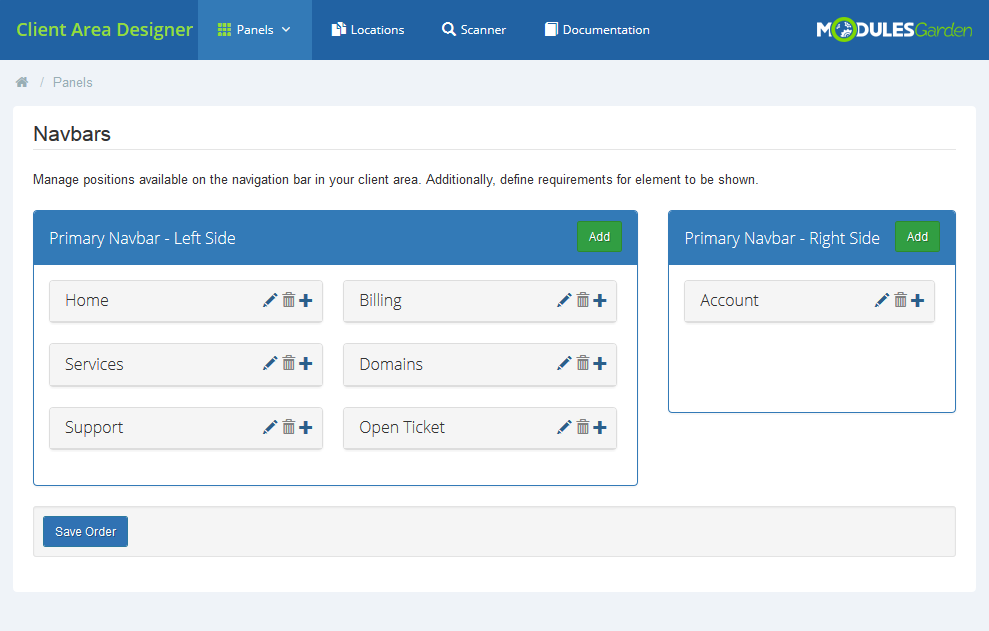
|
Configuration and Management
| Client Area Designer For WHMCS is a module which allows you to adjust the layout of any panels available on your client area as well as add new widgets sections. The module does not require highly advanced configuration. |
Panels
Under 'Panels' tab you will find three sections dedicated to the visibility of different types of panels in your client area.
|
| On the first sight you will see two tables, each related to Primary Navbar Left or Right side. There are already all the predefined sections outlined with their official names and positions. |
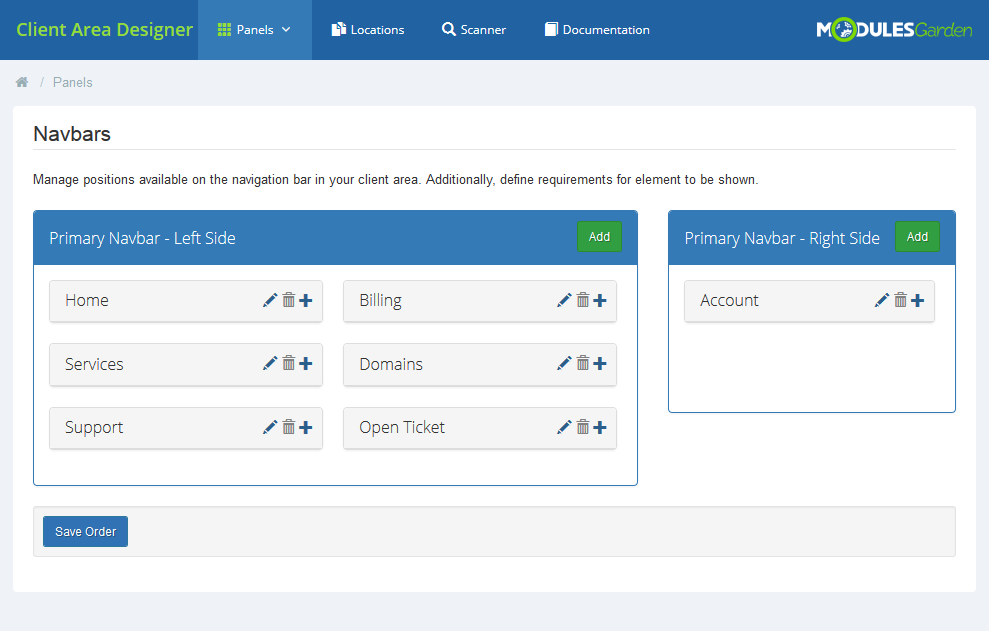
|
| Those are the below navbar panels visible in the client area. |
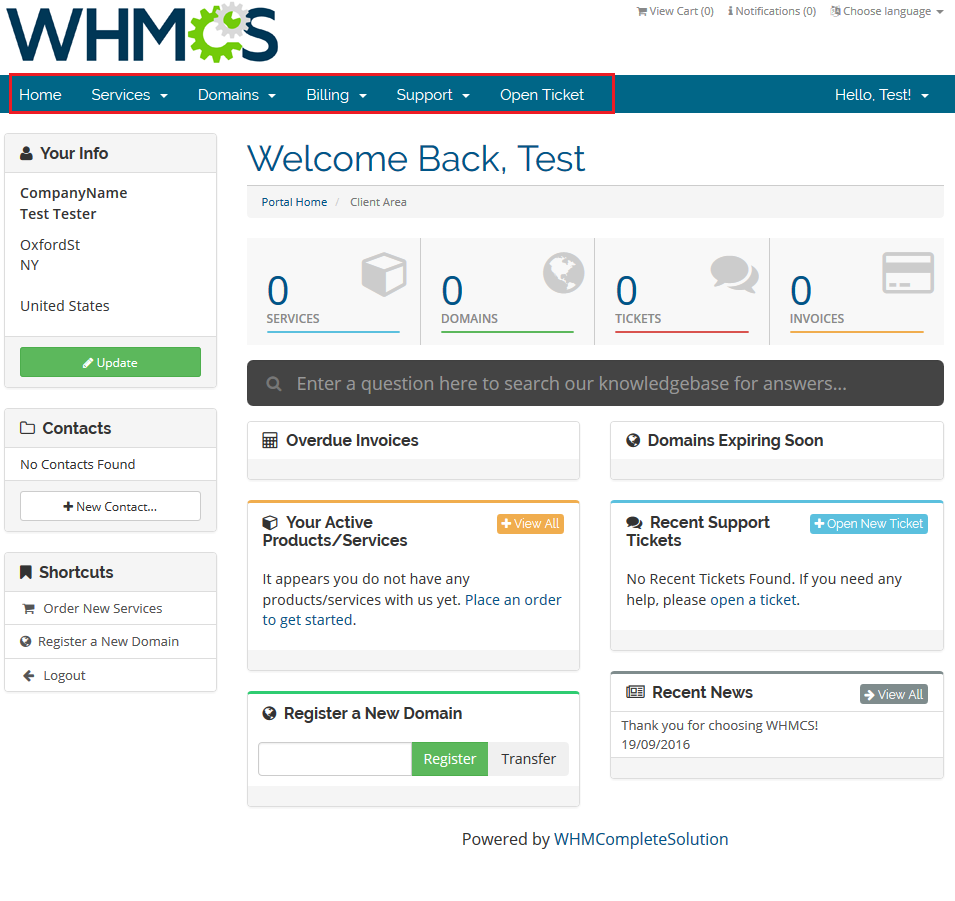
|
| First of all, you may change the position of the elements. Drag one panel and drop it in the required place. |
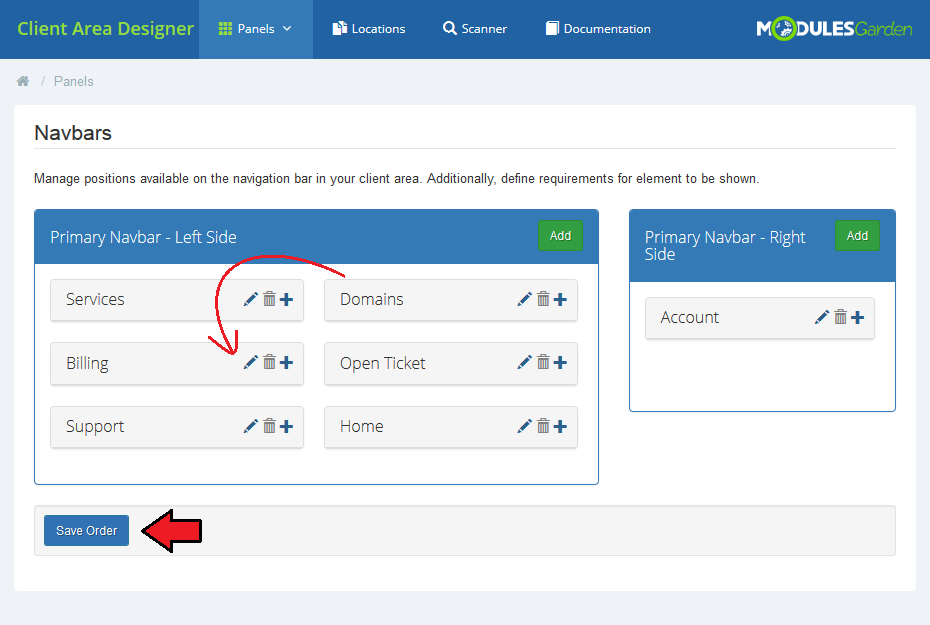
|
Use action buttons to:
|
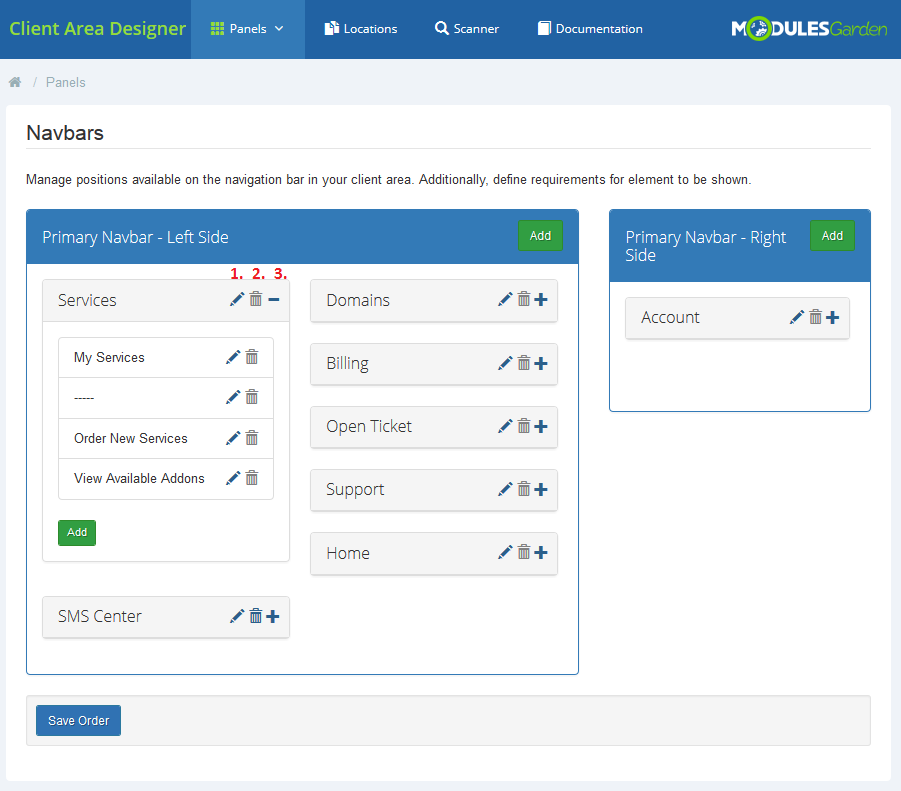
|
Edit Element
When you are editing an existing parent element, you may:
|
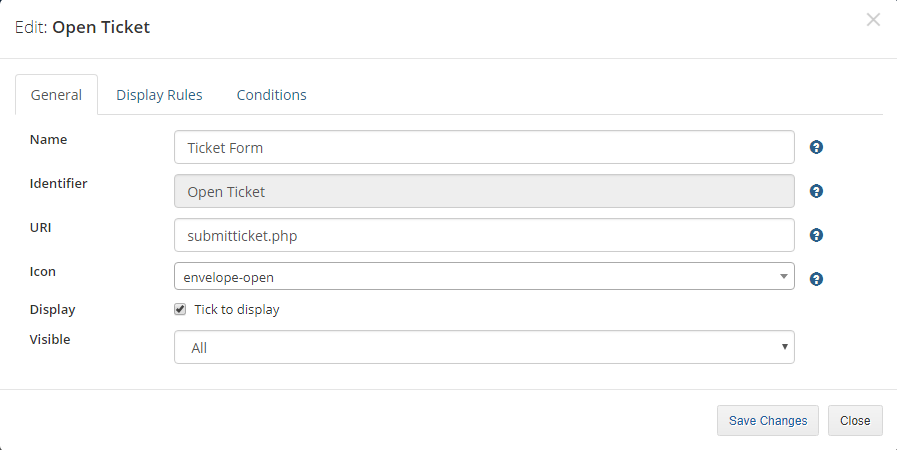
|
| You may also provide some display rules, only clients who fulfill the rules will see the element. If you leave this part empty, the element will be visible for all clients without limitations.
Do not forget to save the changes when ready. |
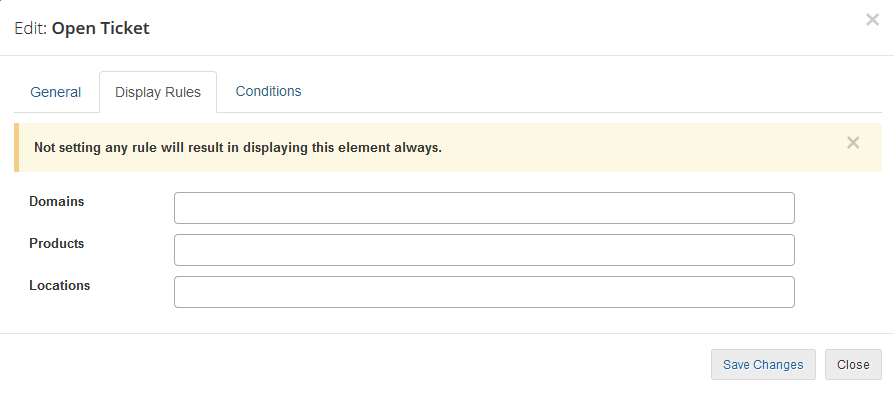
|
New Parent Elements
| It is possible add a completely new parent element either on left or right side. Press 'Add'. |
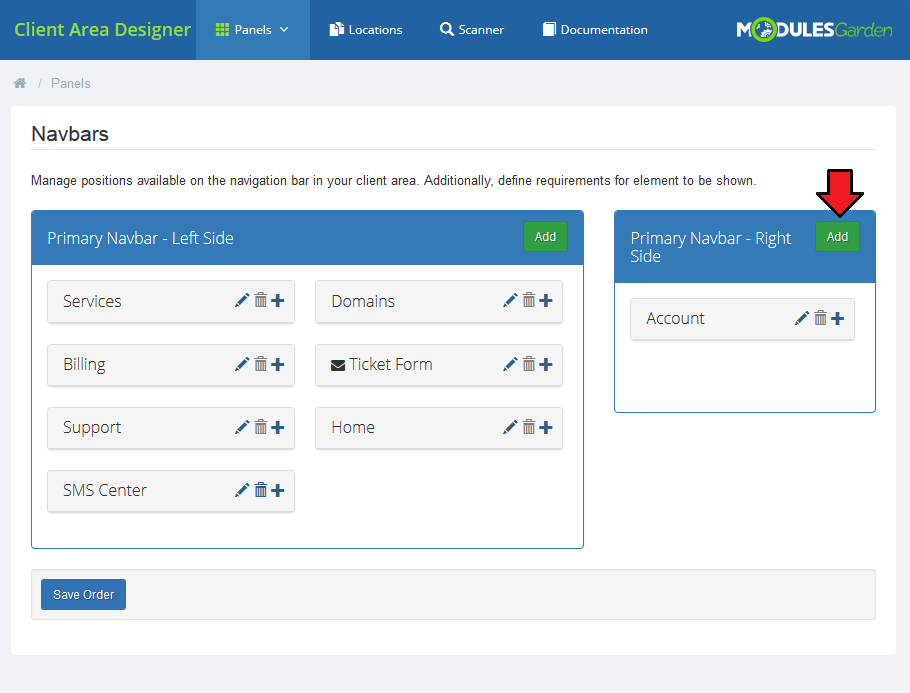
|
| Then you will have to fill out all the general info, content and display rules. Start with 'General'. Provide:
|
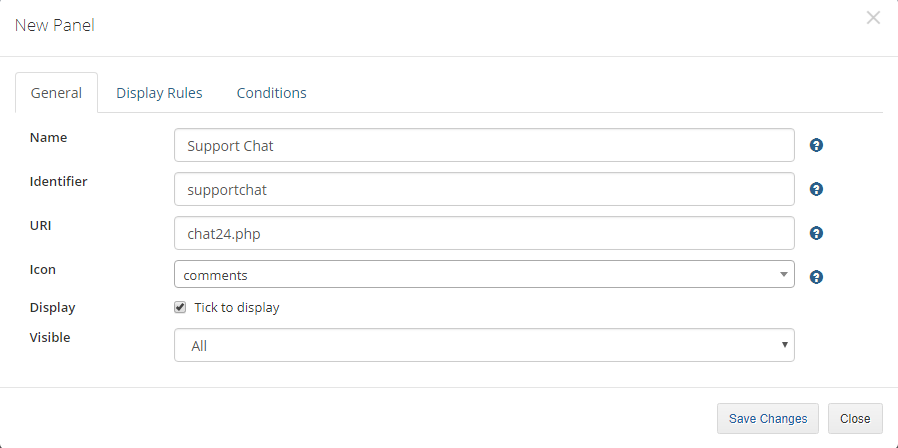
|
| If you want only some of the clients to see the panel, then set up the 'Display Rules'. Save the changes in the end. |
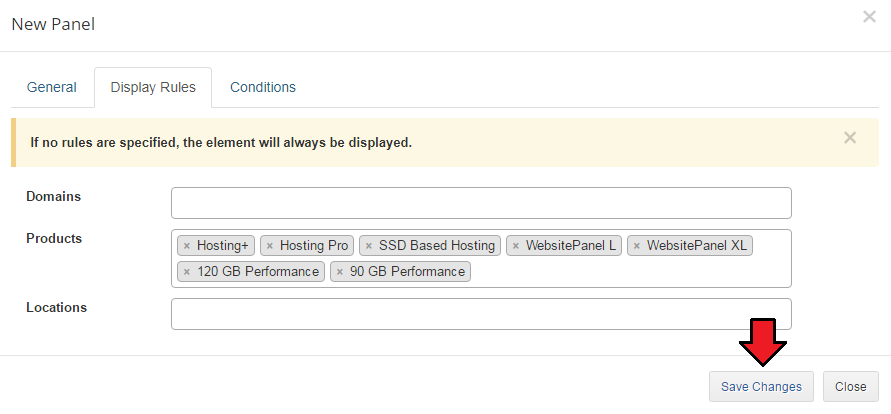
|
| This is how our new panel looks like in the client area: |
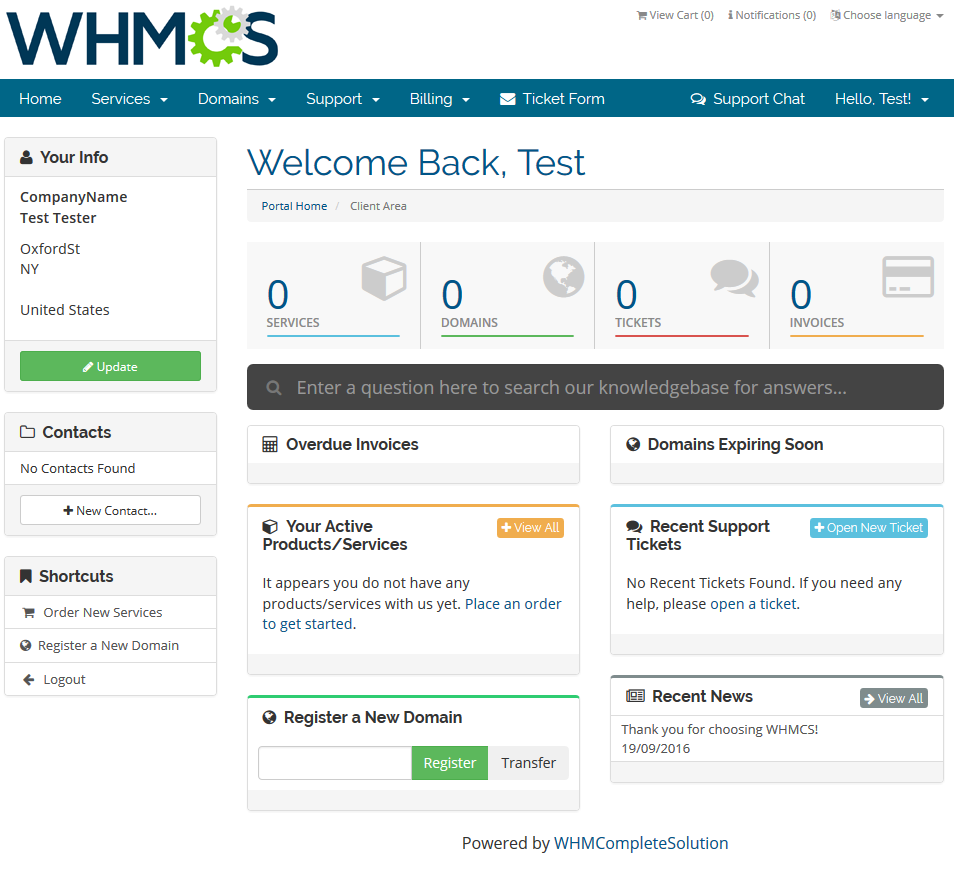
|
New Child Element
| Let's now add one child element to the just created 'Test Panel'. |
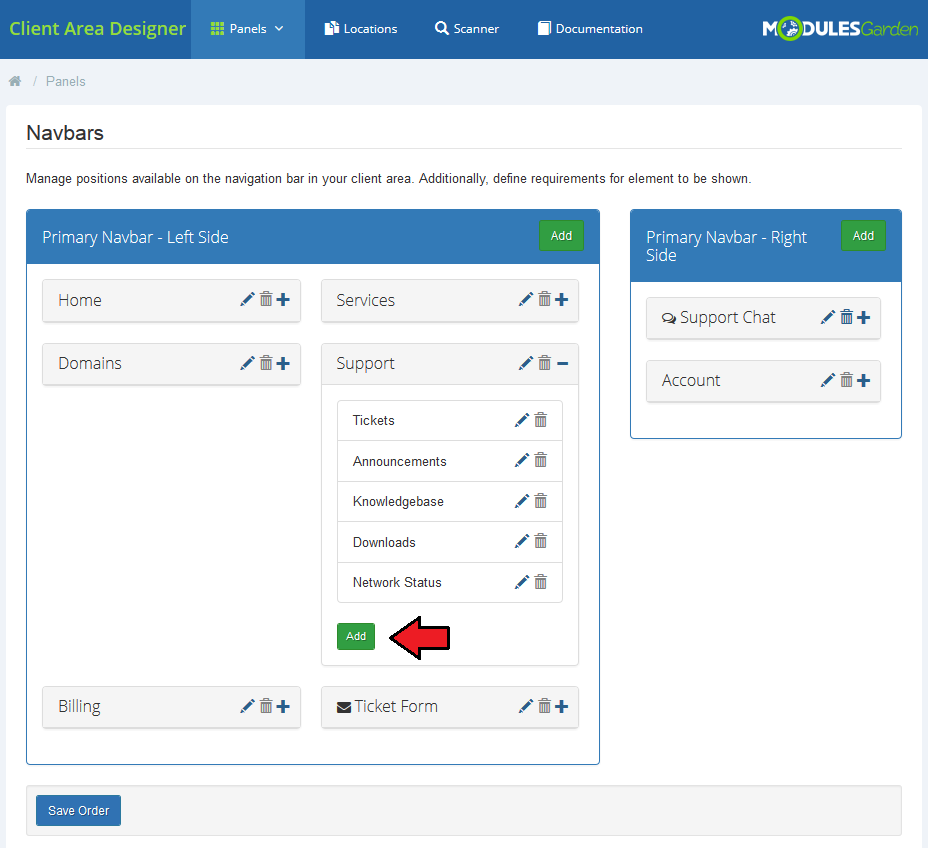
|
You have to fill out the same data as in case of parent element:
|
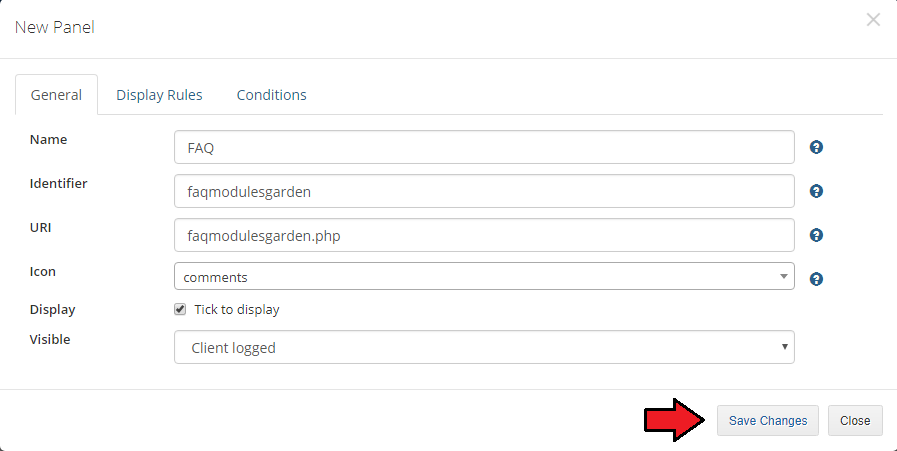
|
| Again, you can set up the 'Display Rules'. Save the changes. |
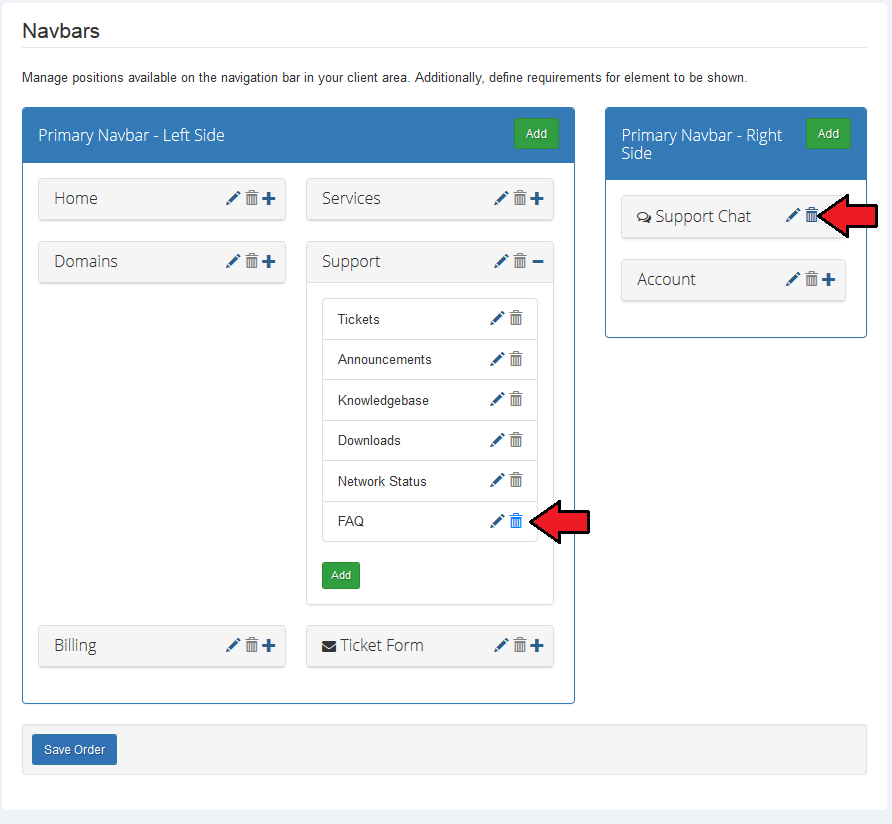
|
| As Sidebar element, you may delete it completely or edit. |
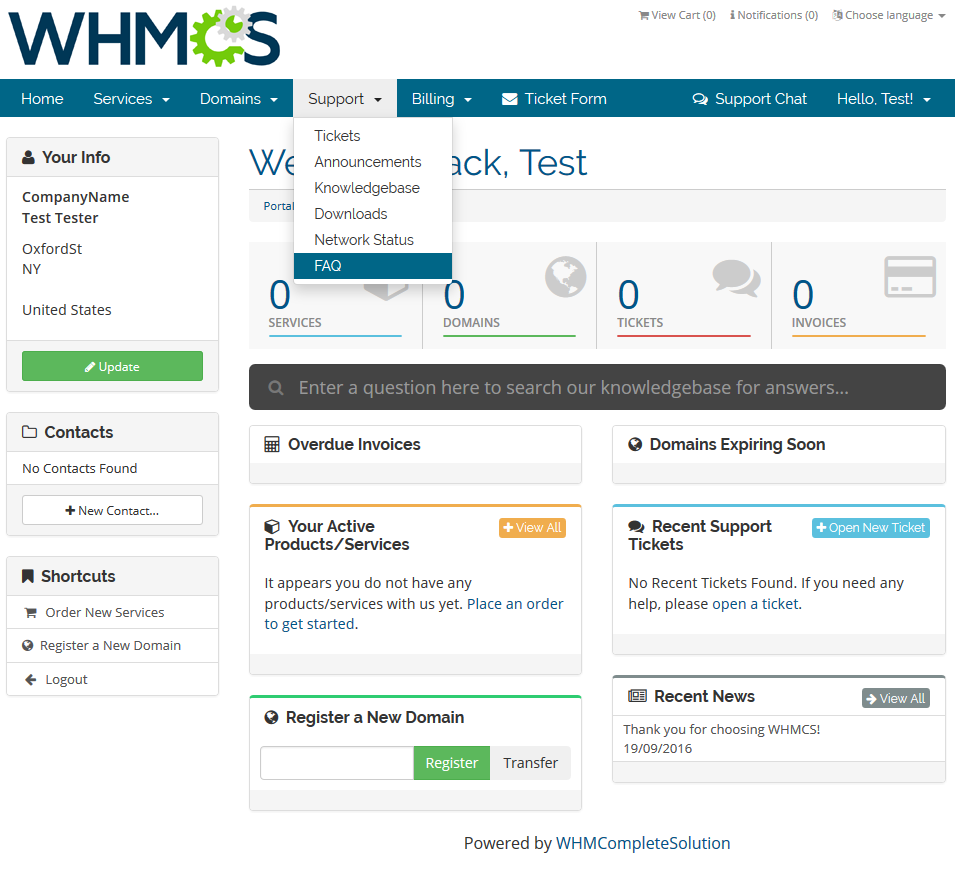
|
| This is how our new panel looks like in the client area: |
| File:CAD 22.png |
Sidebar Panels
| Sidebar panels section refer to the elements located on the left side of your client area. Generally, management of sidebars is very similar to Navbar panels described in the previous section. |
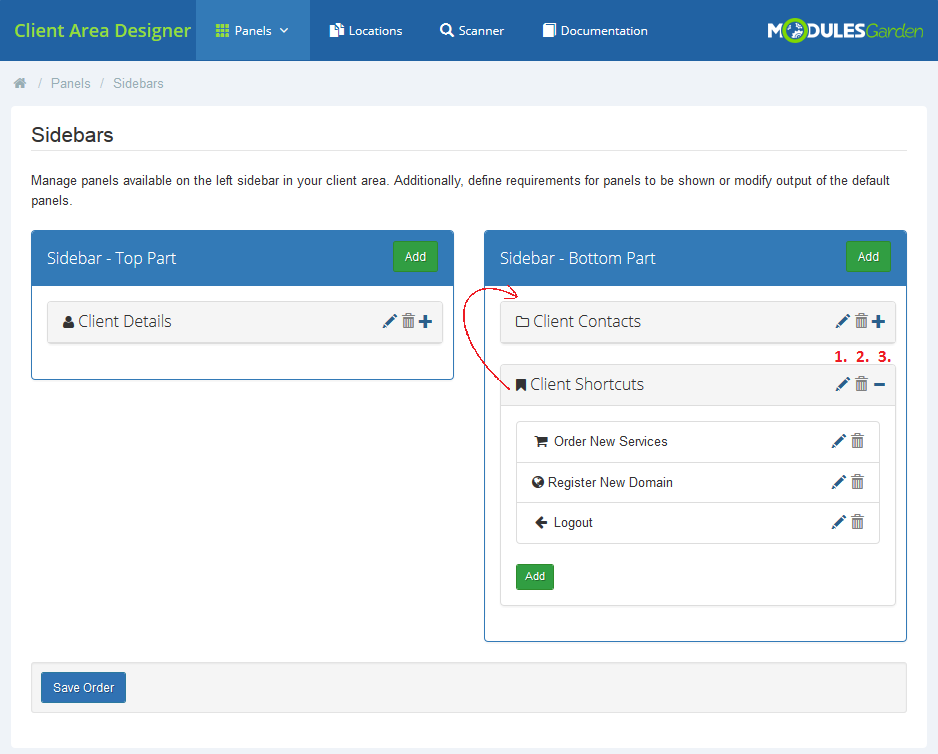
|
Available actions:
|
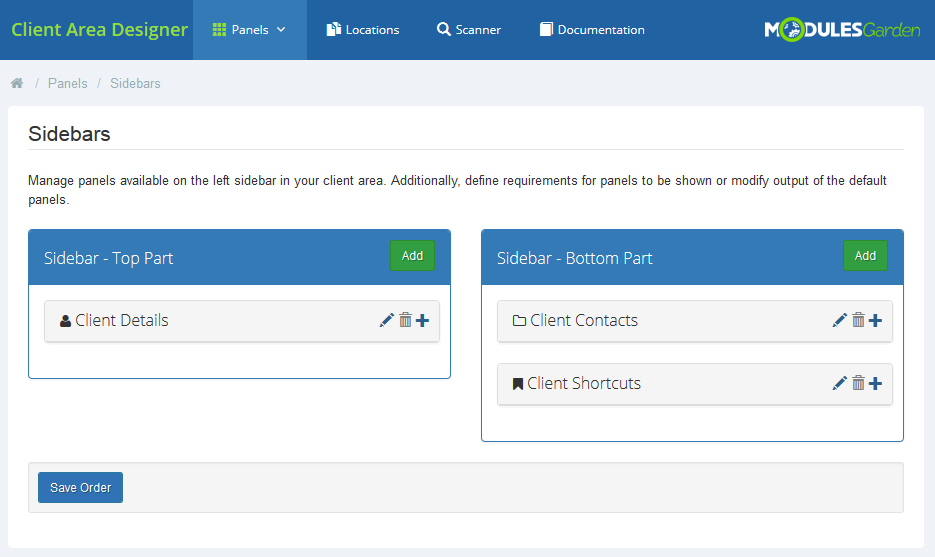
|
Edit Element
General - this part is the same as in Navbars
|
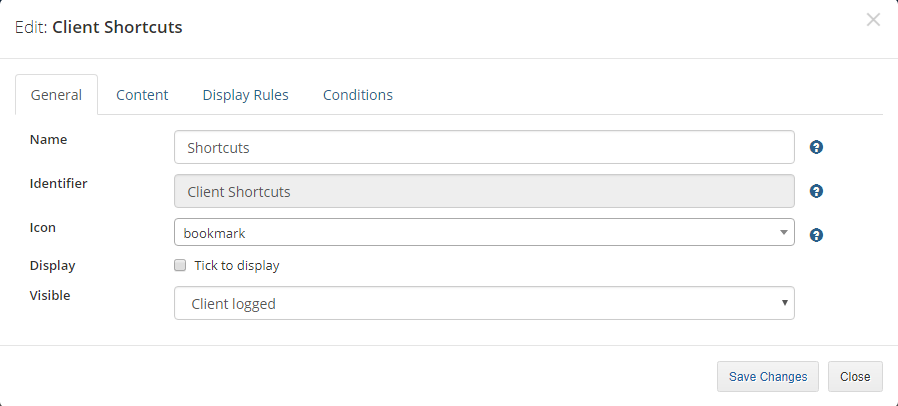
|
Content
Note that it is possible only if the element has no child elements. |
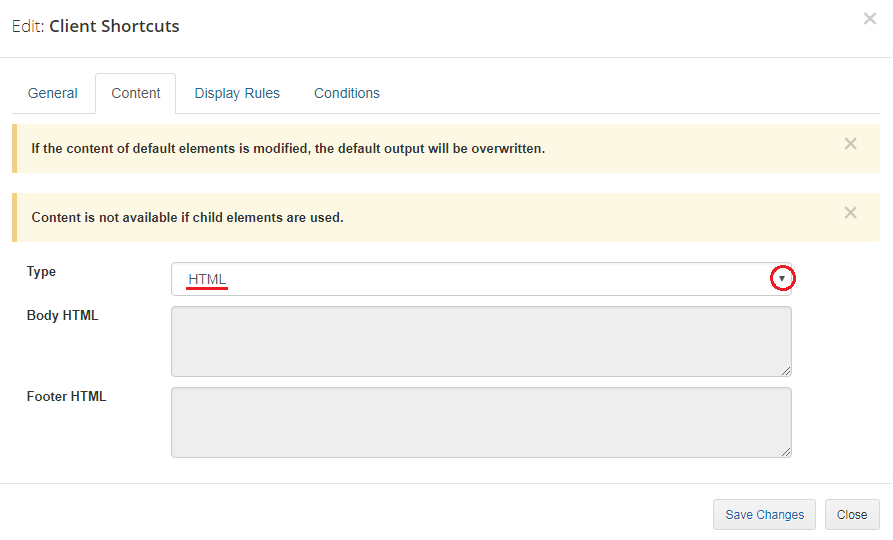
|
| Display rules - only clients who fulfill the rules will see the element. If you leave this part empty, the element will be visible for all clients without limitations. Do not forget to save the changes when ready. |
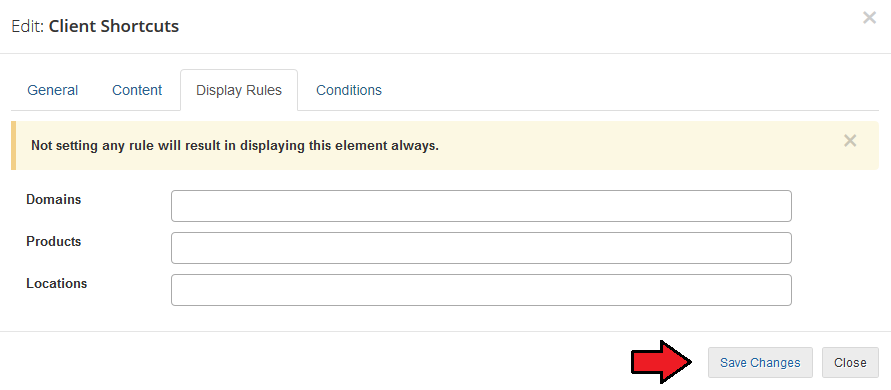
|
New Parent Elements
| You may add a completely new parent element either on left or right side. Press 'Add'. |
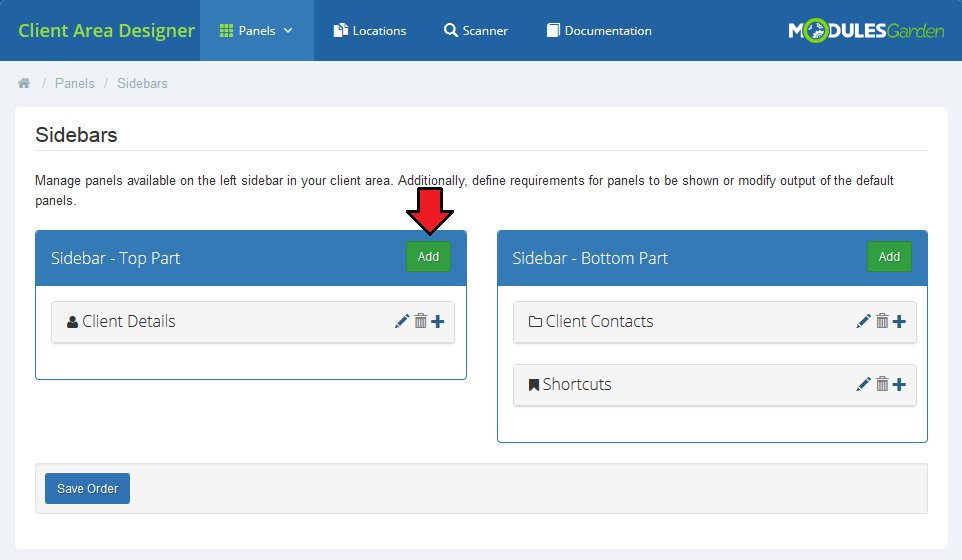
|
| Then you will have to fill out all the general info, content and display rules. Start with 'General'. Provide:
|
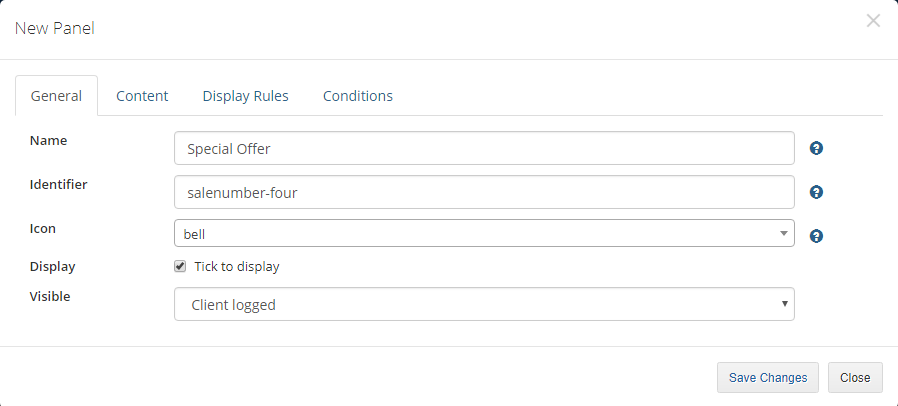
|
| Define Body and Footer content. Note that if you provide the content here, you will not be able to add child elements to this item. |
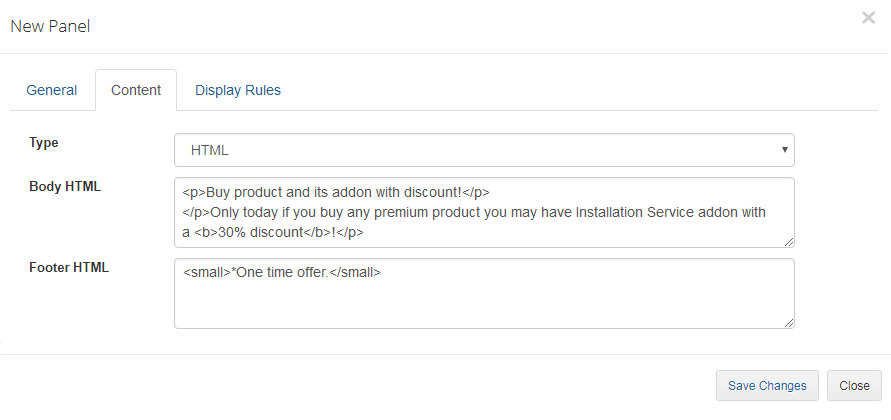
|
| If you want only some of the clients to see the panel, then set up the 'Display Rules'. Save the changes in the end. |
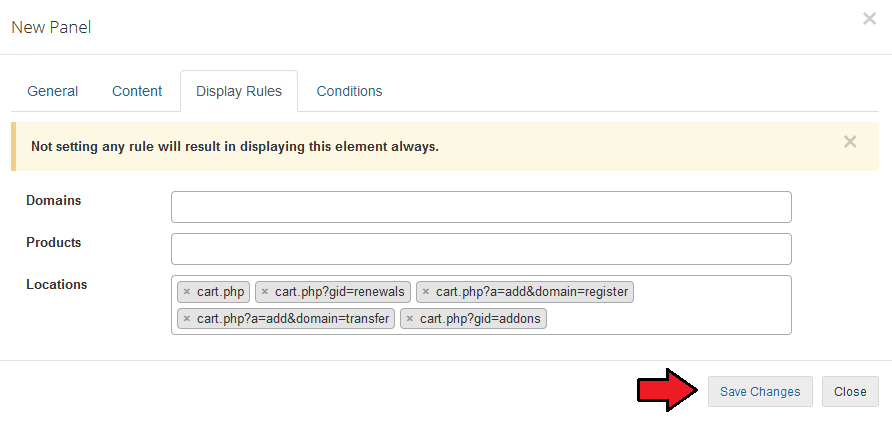
|
| This is how our new panel looks like in the client area: |
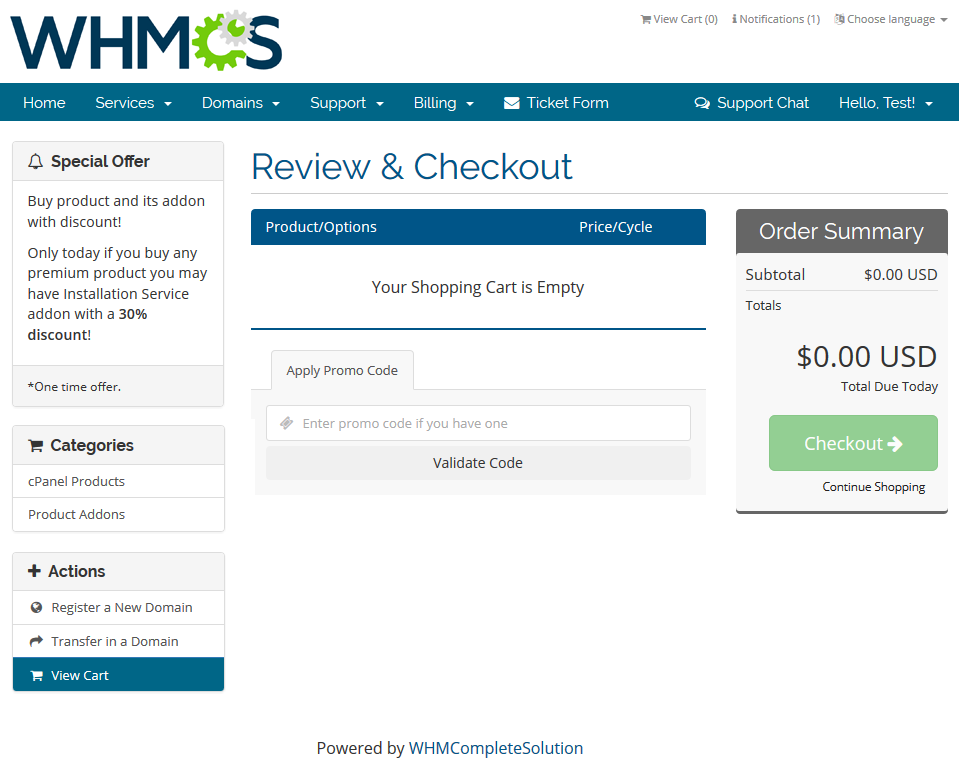
|
New Child Element
| Let's now add one child element to the just created 'Test Panel'. |
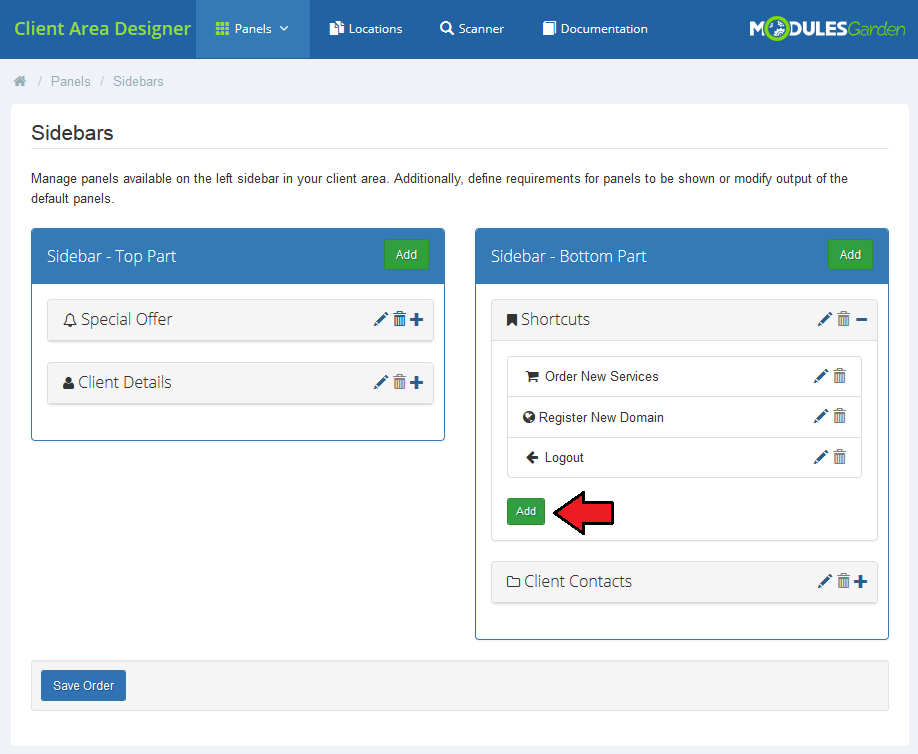
|
You have to fill out the same data as in case of parent element:
|
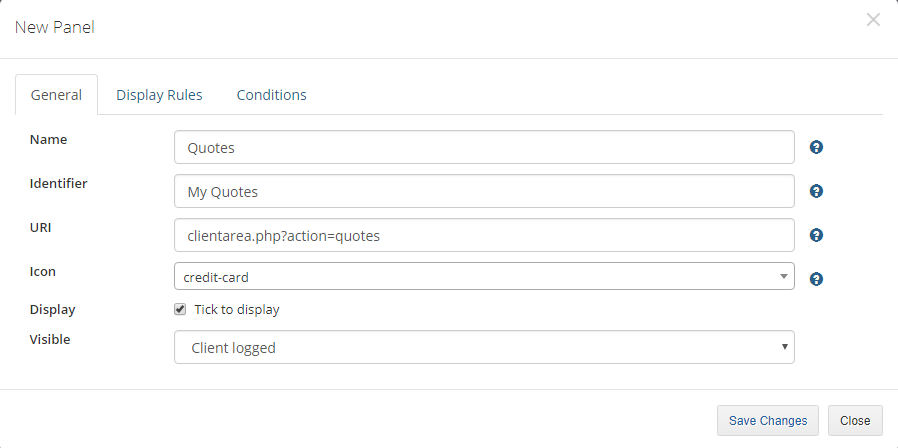
|
| Again, you can set up the 'Display Rules'. Save the changes. |
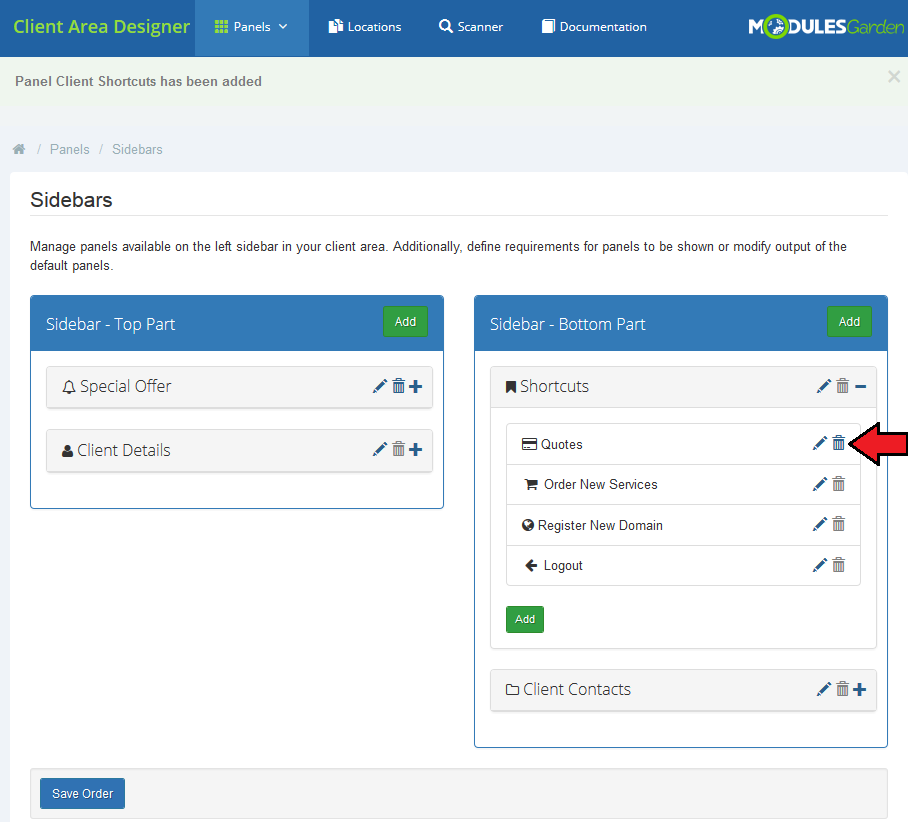
|
| As it is a custom element, you may delete it completely or edit. |
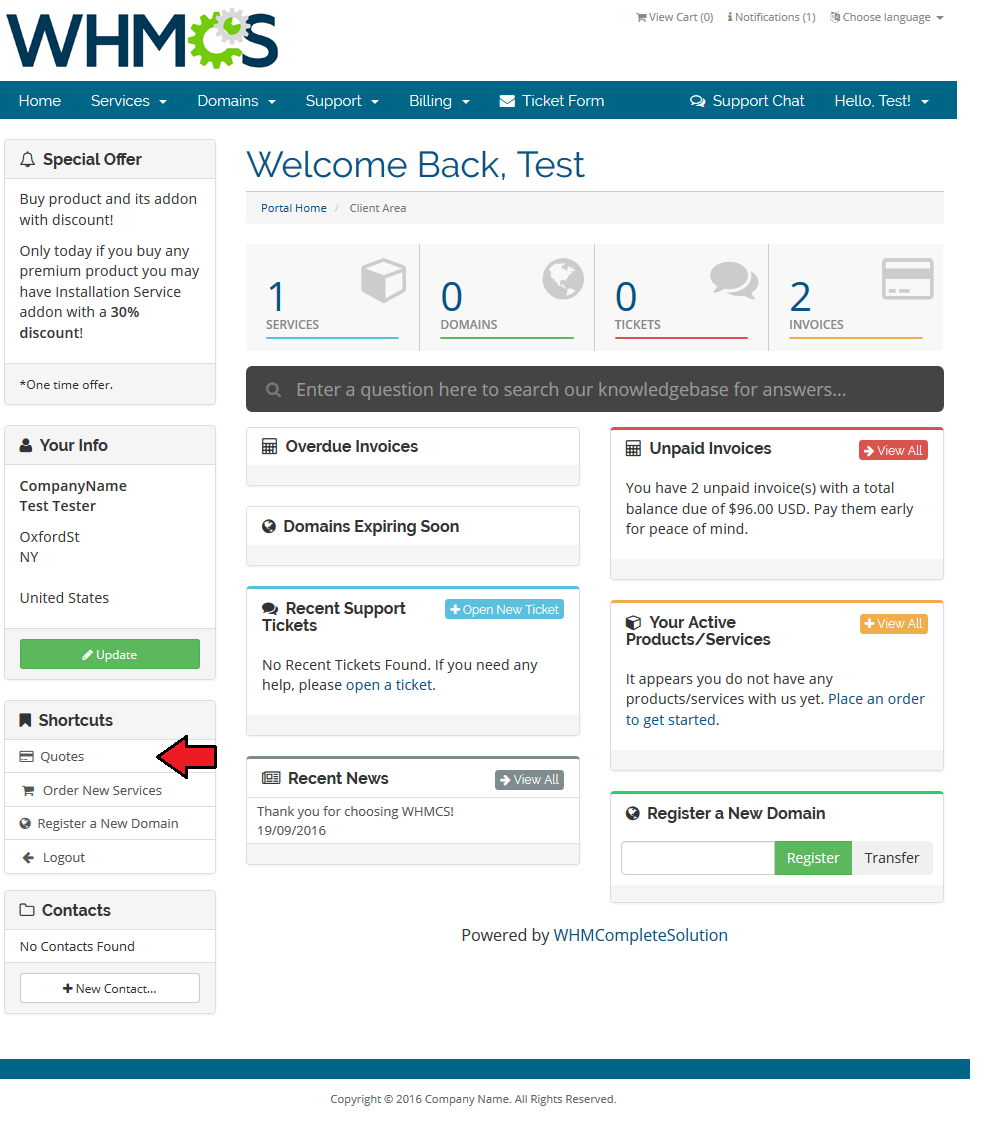
|
| This is how our new panel looks like in the client area: |
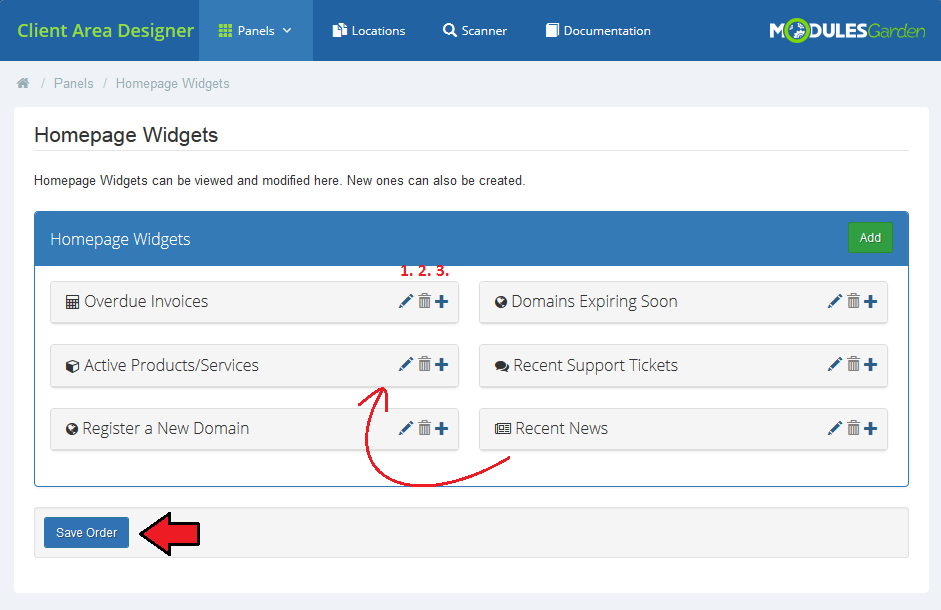
|
Homepage Widgets
| The last type of panels are homepage widgets. |
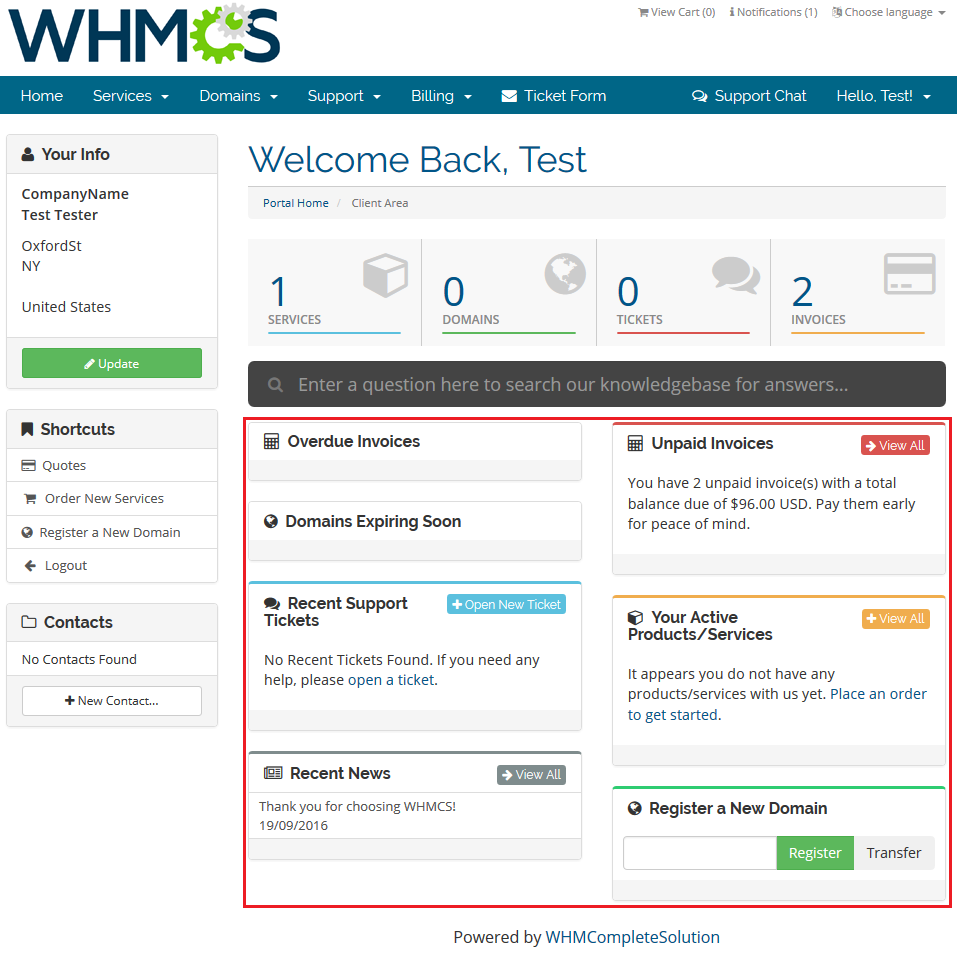
|
| these are these widgets in your client area: |
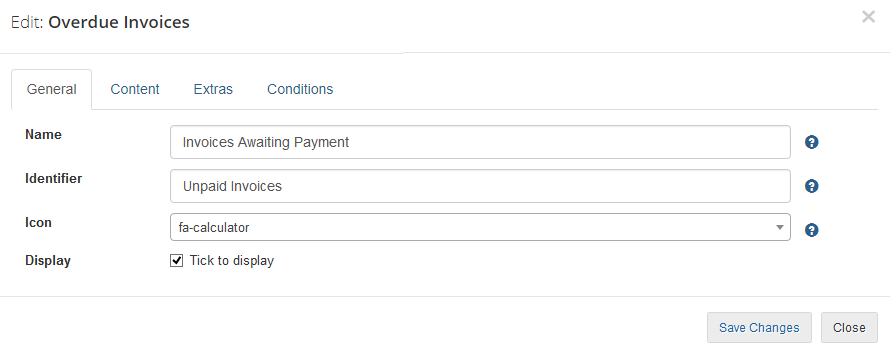
|
Available actions:
|
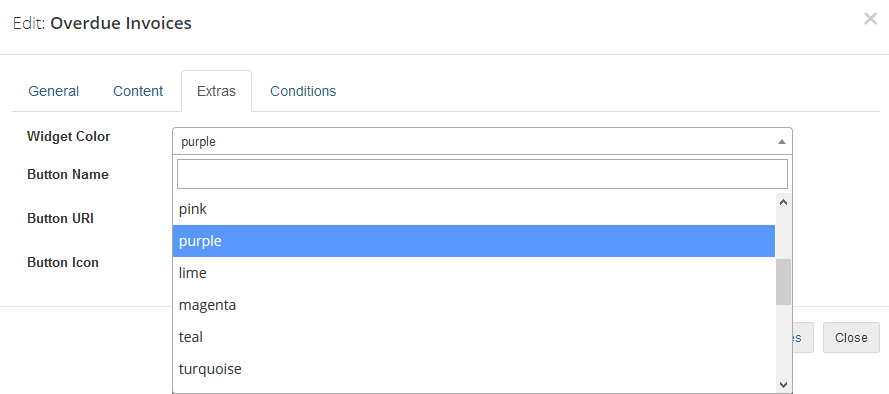
|
Edit widget
General - this part is the same as in Navbars
|
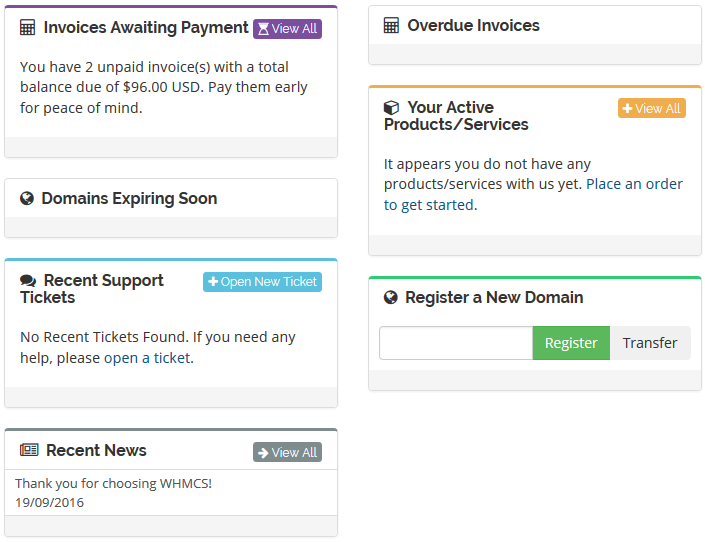
|
Content
Note that it is possible only if the element has no child elements. |
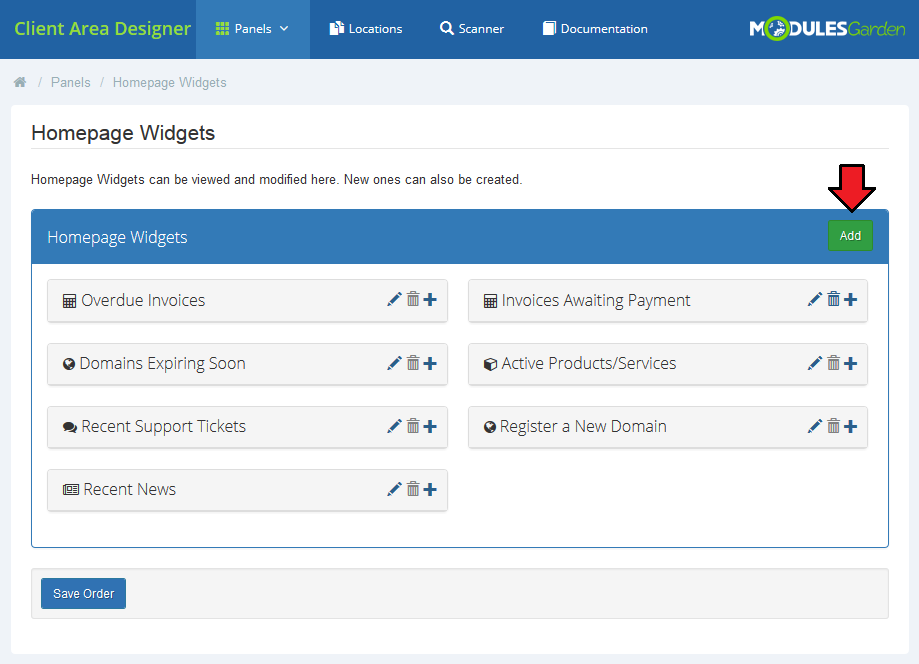
|
Extras - here you can change the visual parts:
|
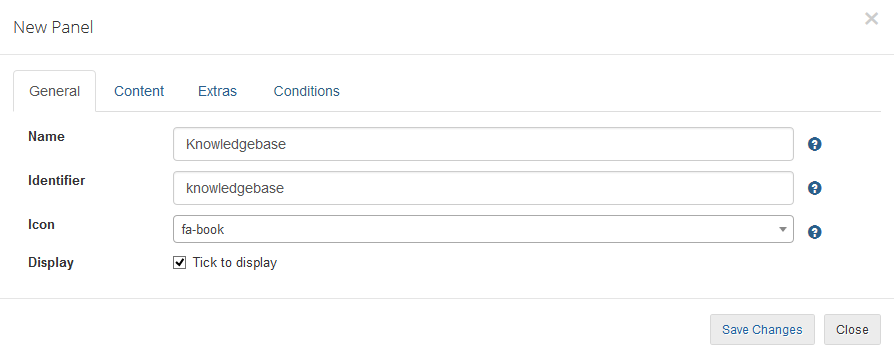
|
Add New Widget
| To create a new widget, simply press 'Add' button. |
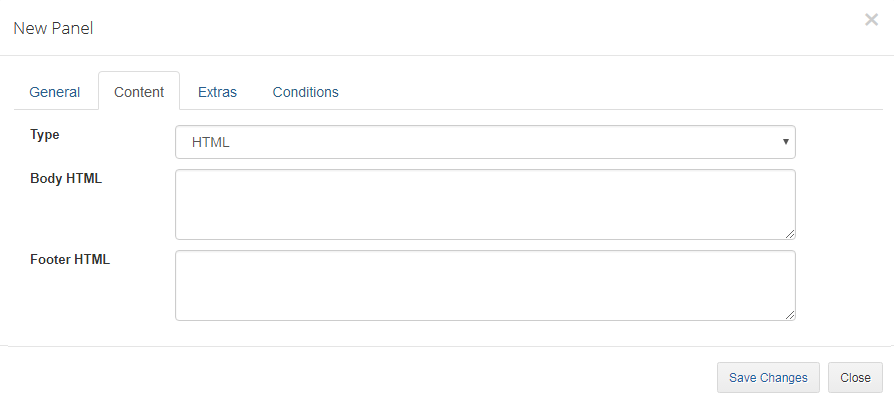
|
| Then you will have to fill out all the general info, content and extras. Start with 'General', provide:
|
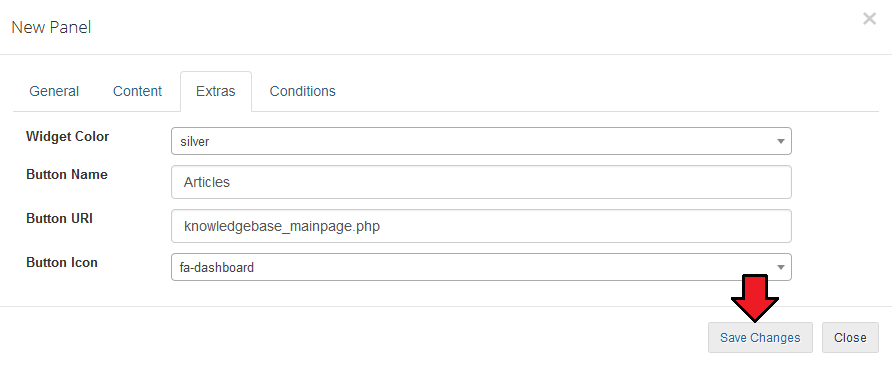
|
| Provide HTML content or leave empty if you plan to add some child links. |
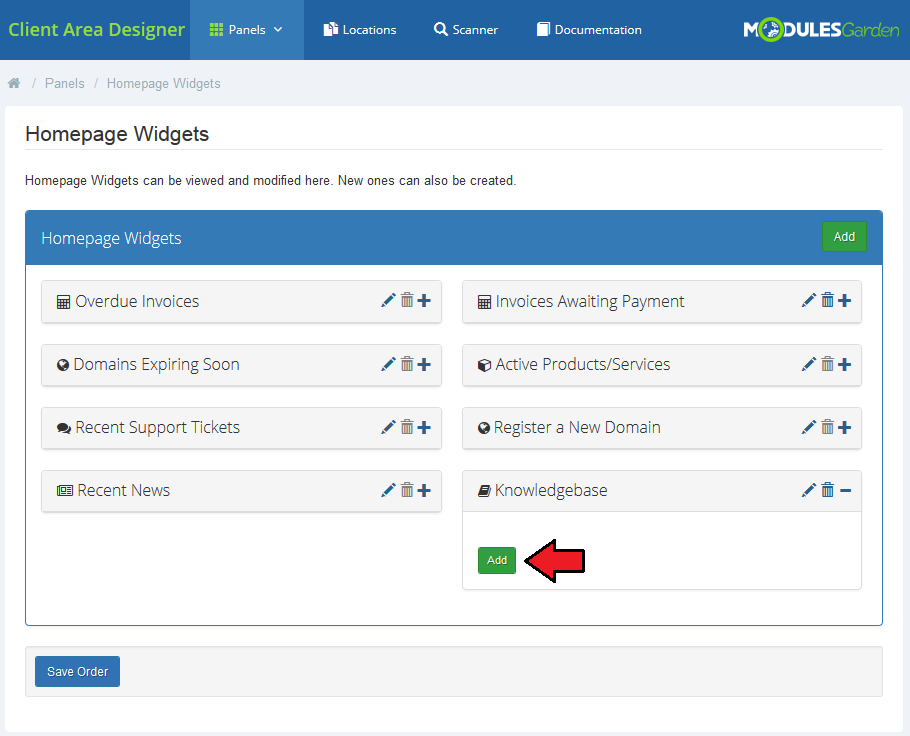
|
| Finally, customize your widget by defining color and button details.
Save the changes in the end. |
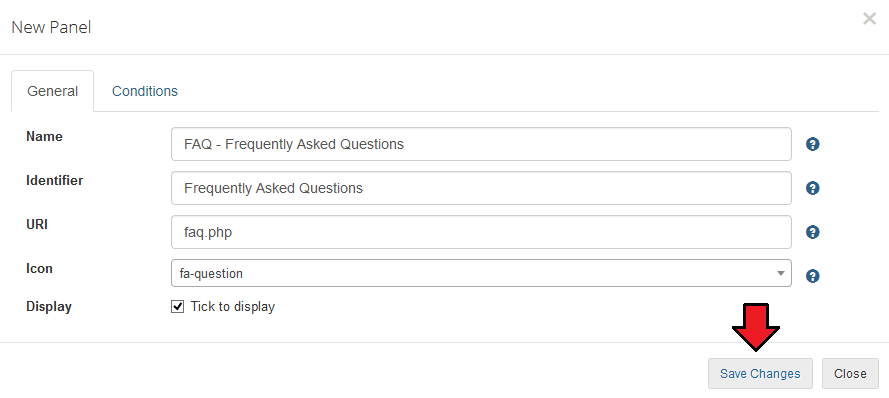
|
| This is how our new widget looks like in the client area: |
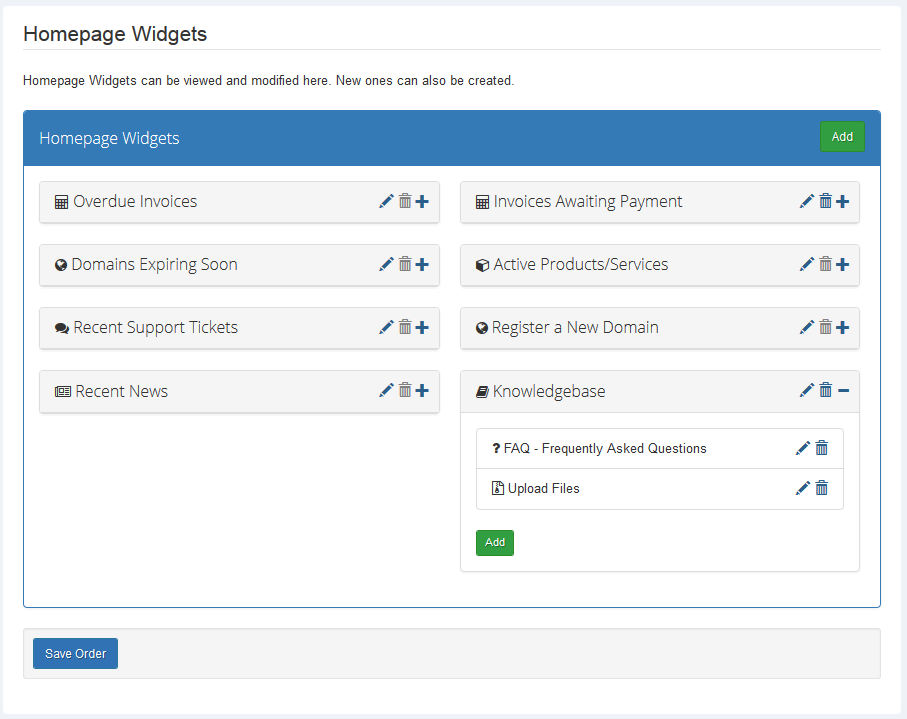
|
New Child Widget
| Let's now add one child element to the just created 'Test Panel'. |
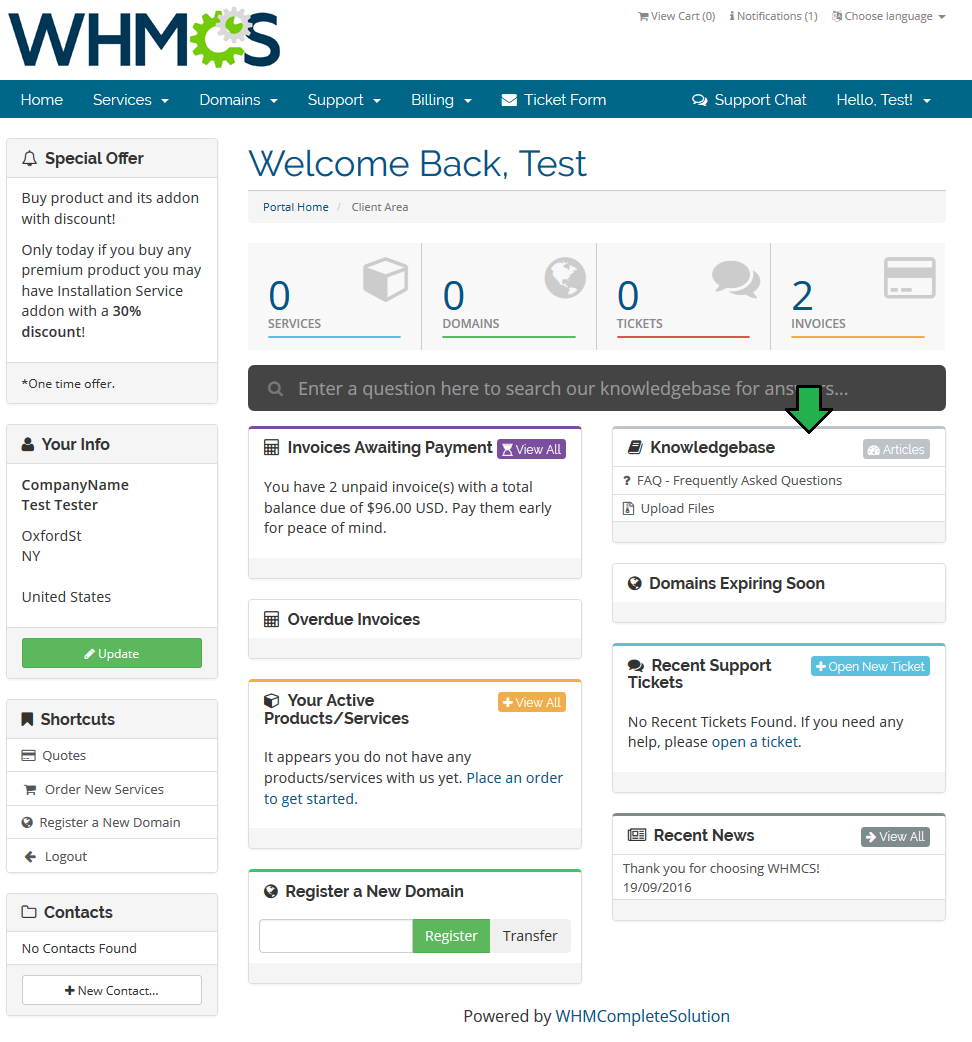
|
You have to fill out the same data as in case of parent element:
|
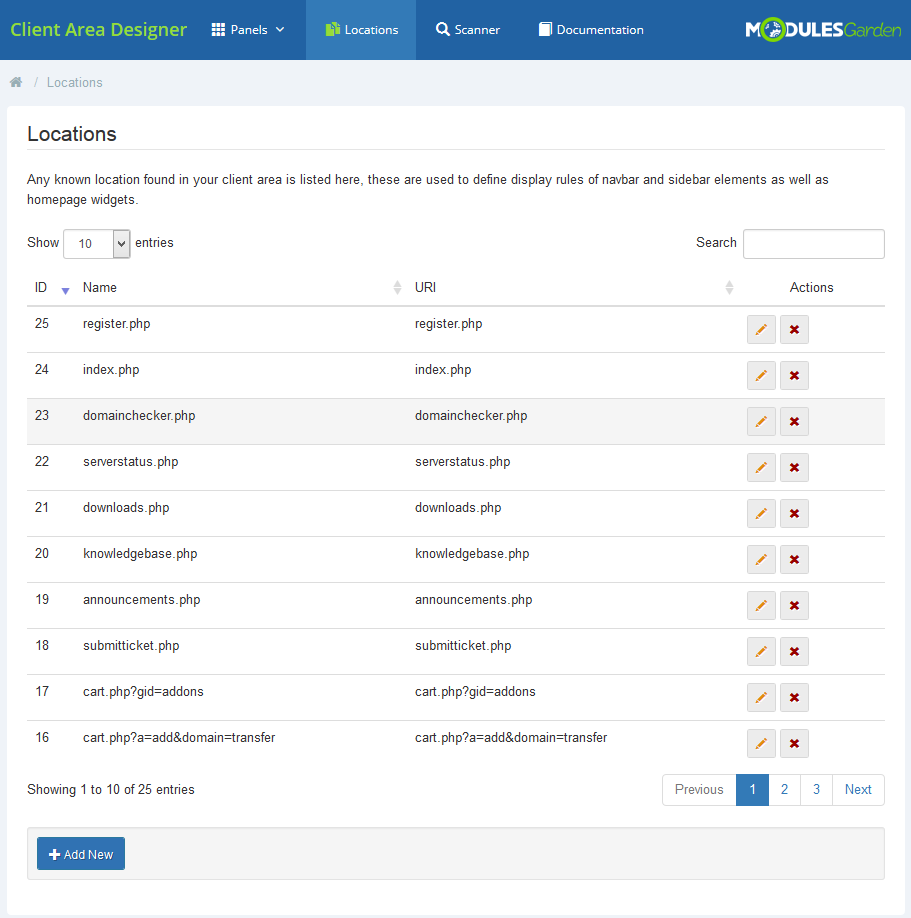
|
| Again, you can set up the 'Display Rules'. Save the changes. |
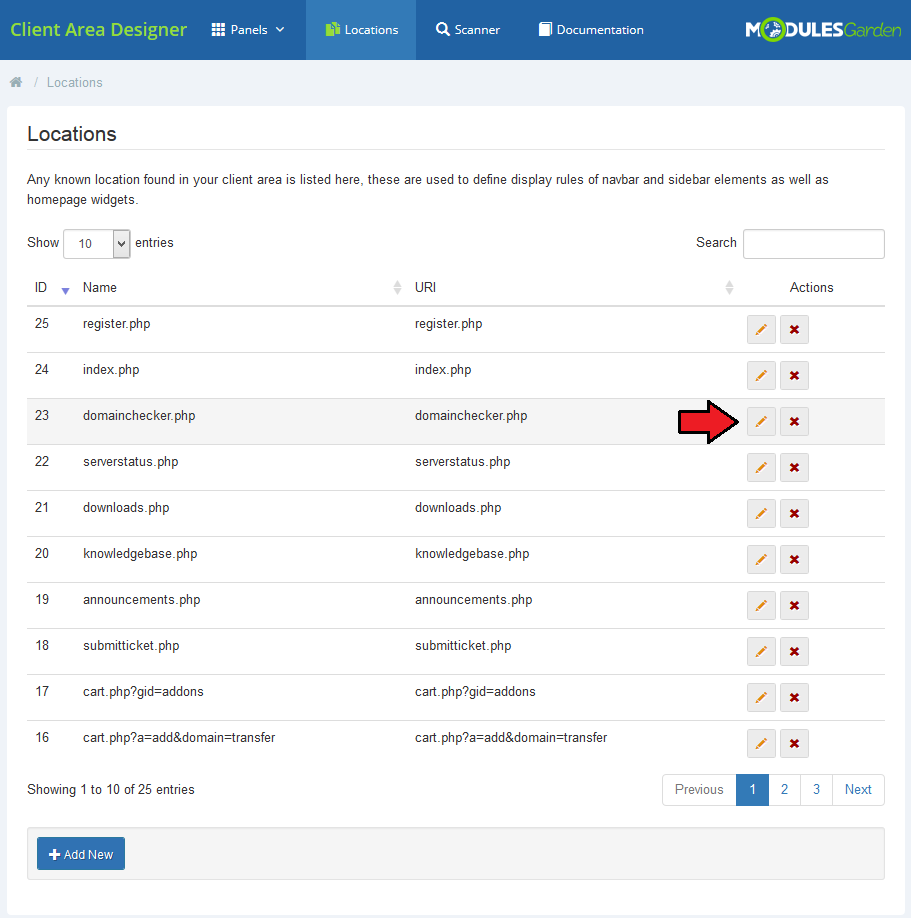
|
| As it is a custom element, you may delete it completely or edit. |

|
| This is how our new panel looks like in the client area: |
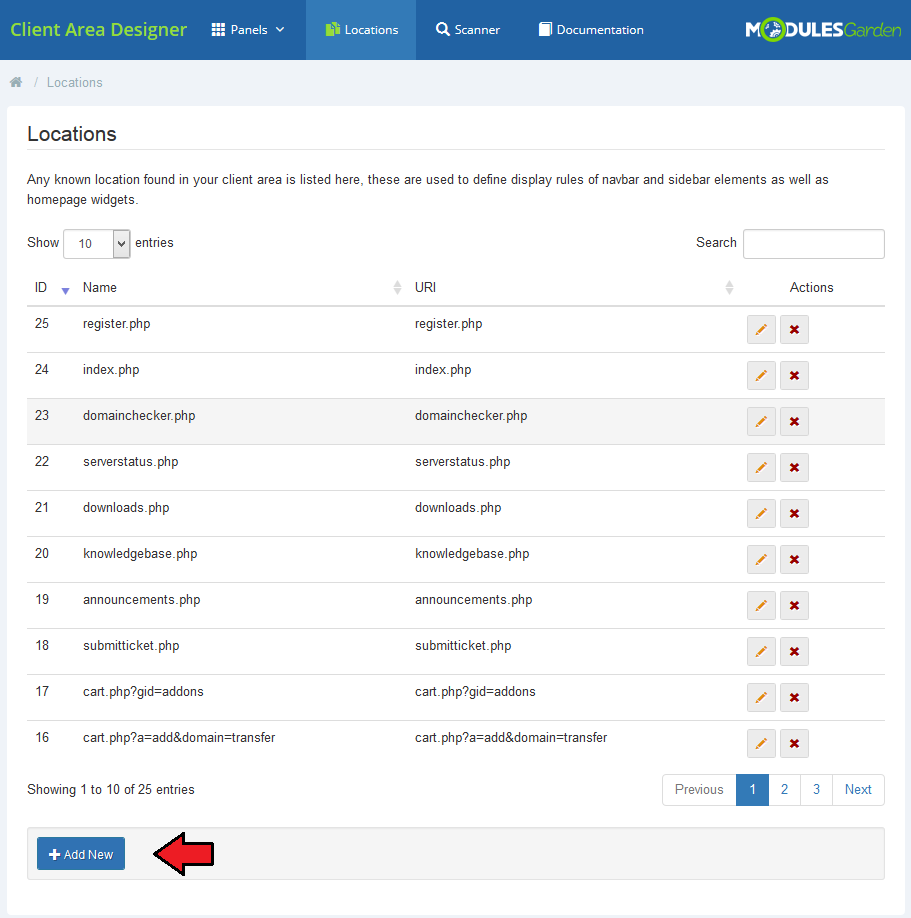
|
Locations
| In this you will find an extended list of all standard locations in your client area with its common name and URI. These locations are searched through by the module scanner in search of custom panels and are available in 'Locations' field when setting up 'Display Rules'. |

|
| Press button with pencil icon next to location you are interested in to edit it. |

|
| There you can edit the name of existing location and its URI. |

|
New Location
| You may also add new if you have some custom locations and you wish to use them in our module. Please note that your locations must be manageable by WHMCS. |

|
| Provide location name and URI. When ready, your new location will be from now on used by Client Area Designer module. |

|
Scanner
| Scanner is a tool that allows our module to carefully browse through a chosen client's client area in search of any custom elements in known locations. Select a client to log in as one and run the scanner. |

|
| You will see a preview of all locations. When the scan is finished, you will see a summary with the number of found panels. |

|
Documentation
| The last position in your navigation menu, when pressed, redirects to the article you are currently reading. |

|
Visualizations
| Now, let's take a look what Client Area Designer For WHMCS may give you in practice. Underneath, you will find several examples of pup-ups, each in a different style and of a different type. |
| Type: 'Text' Style: 'left_up' |

|
| Type: 'Text' Style: 'center_overlay' 'Overlay' means there is a gray background behind the pop-up text or image. |

|
| Type: 'Image', Style: 'center' |

|
| Type: 'Image', Style: 'right_overlay_up' |

|
Tips
| 1. Langi tutaj?? |
Common Problems
| 1. When you have problems with connection, check whether your SELinux or firewall does not block ports. |